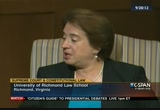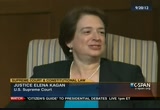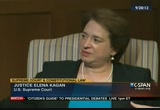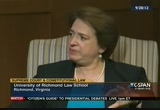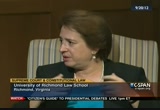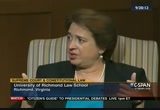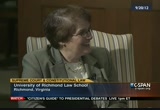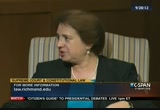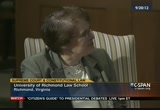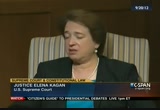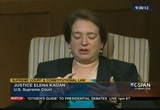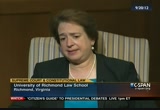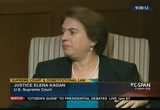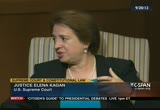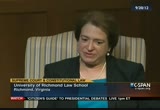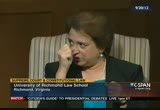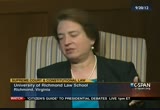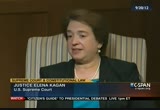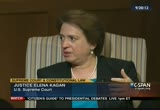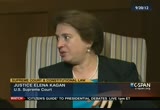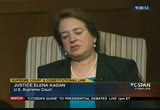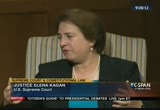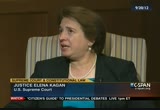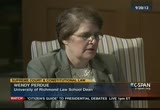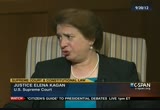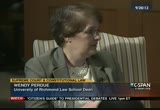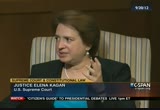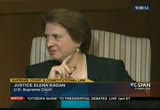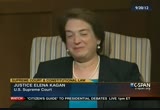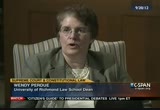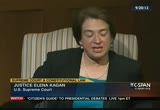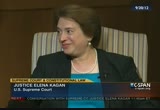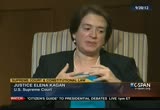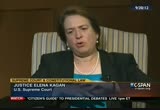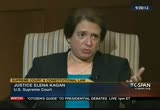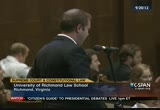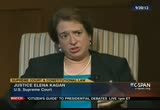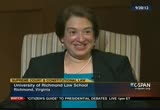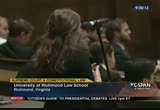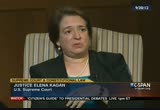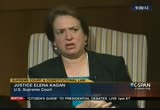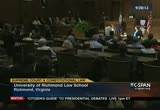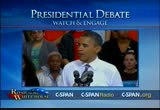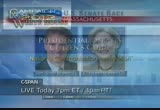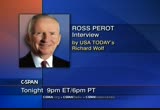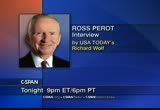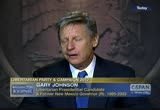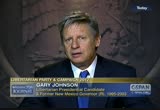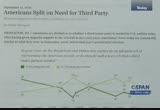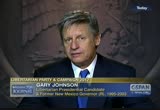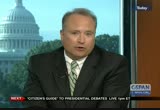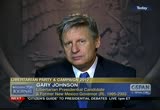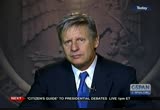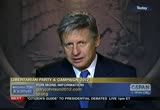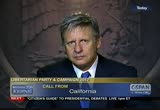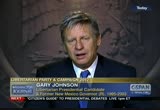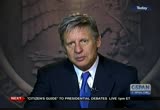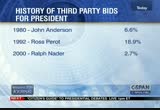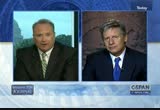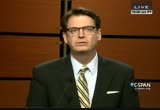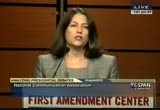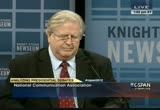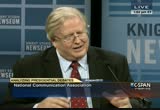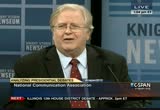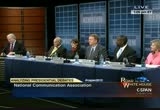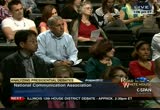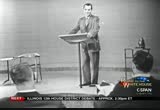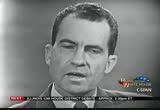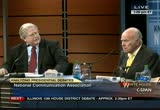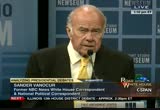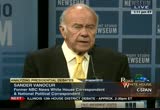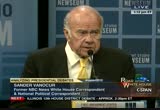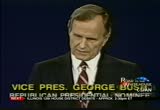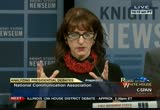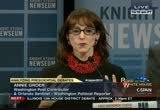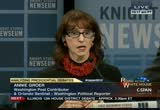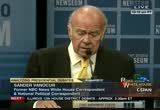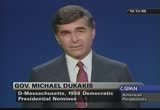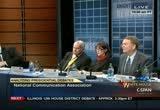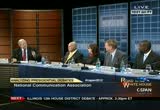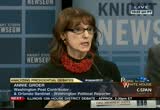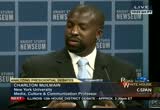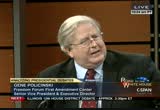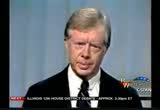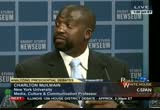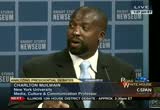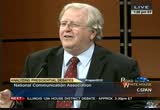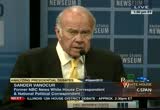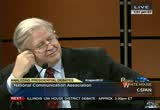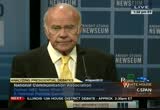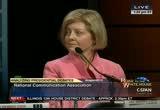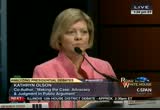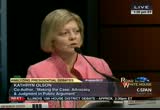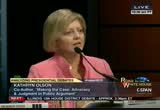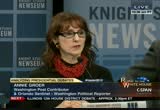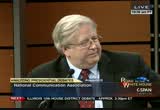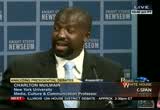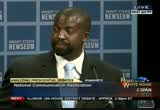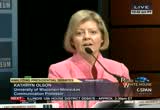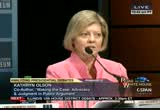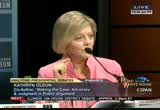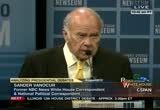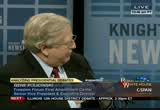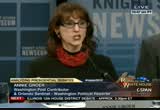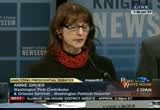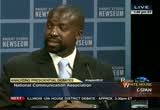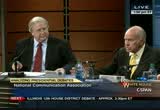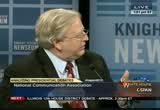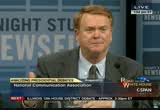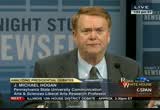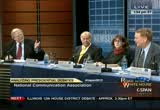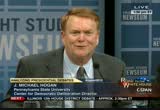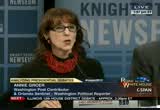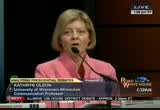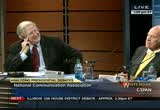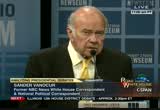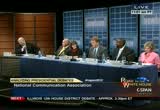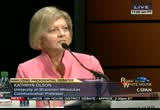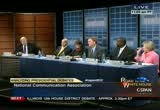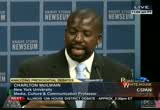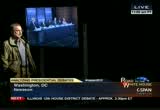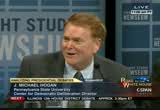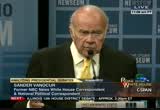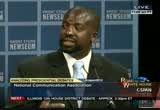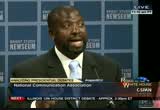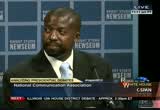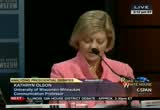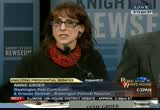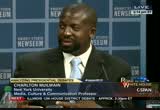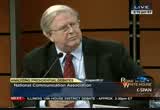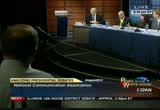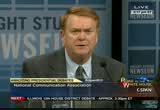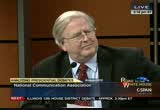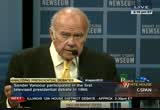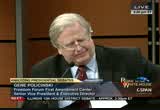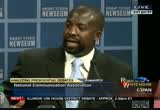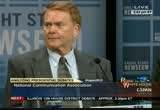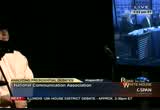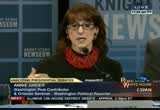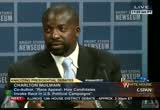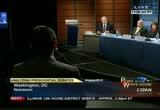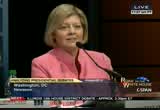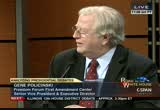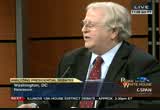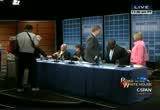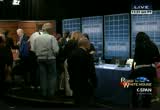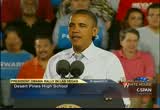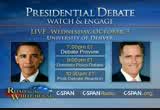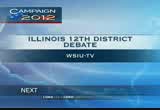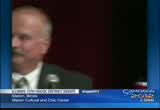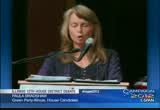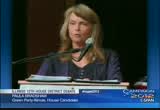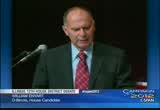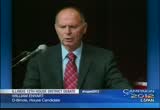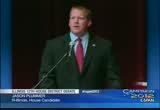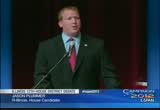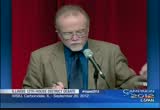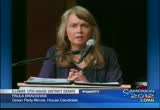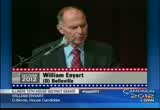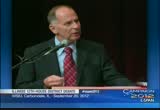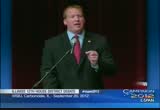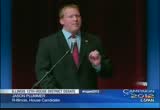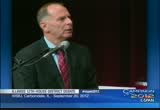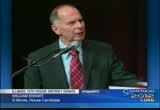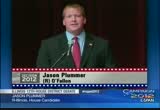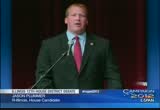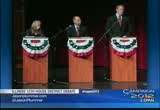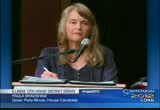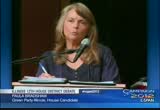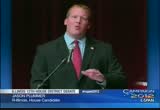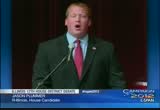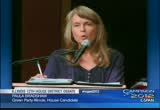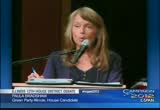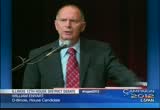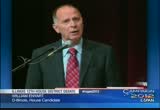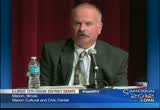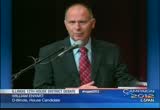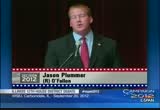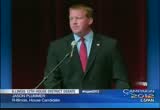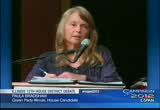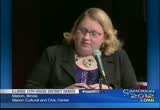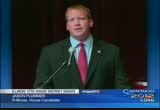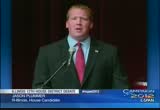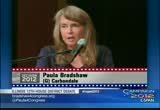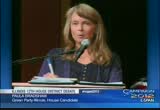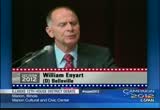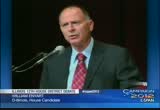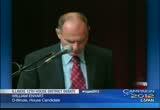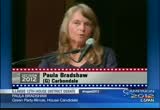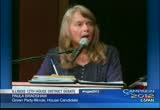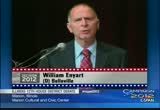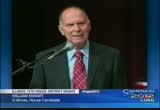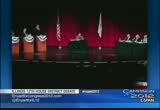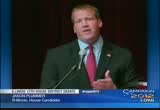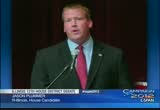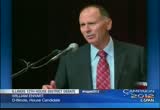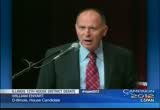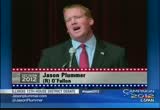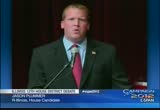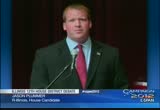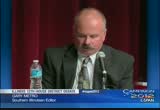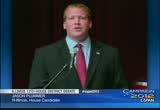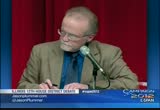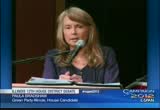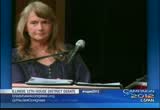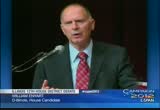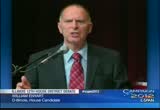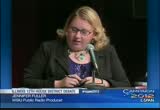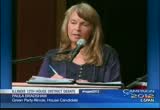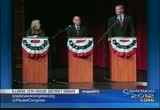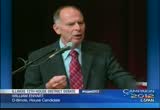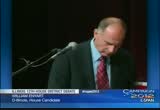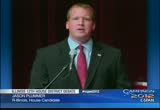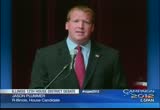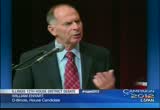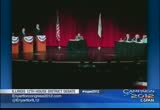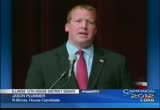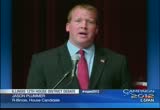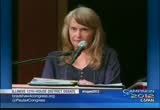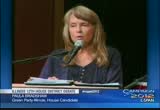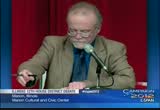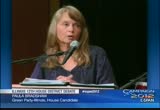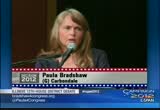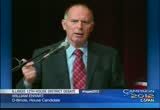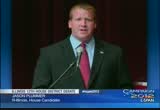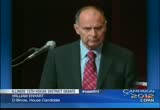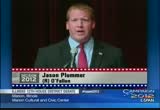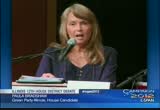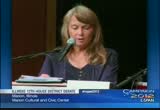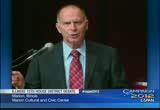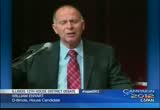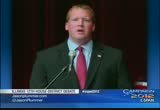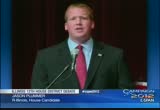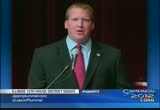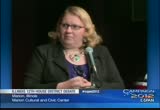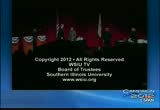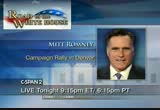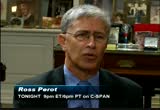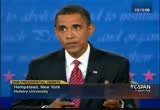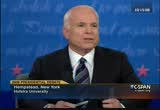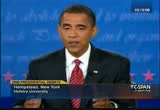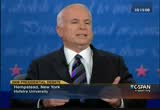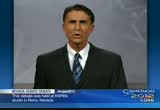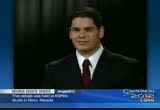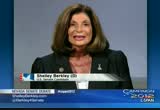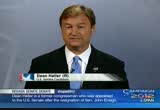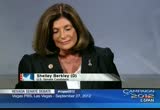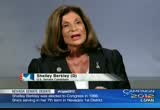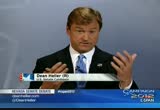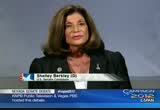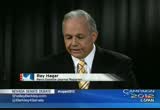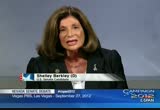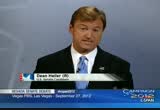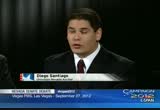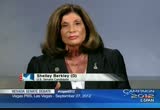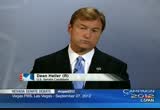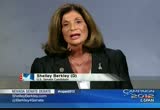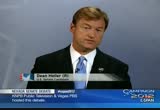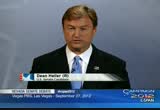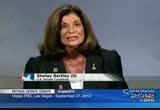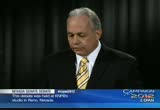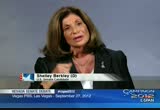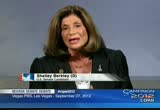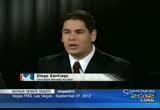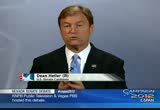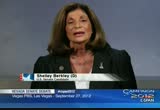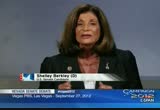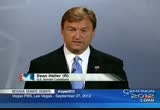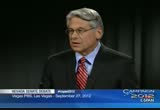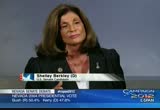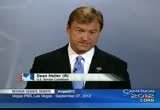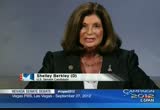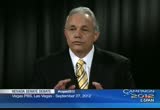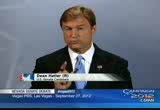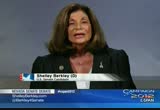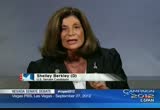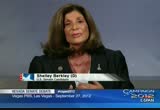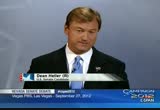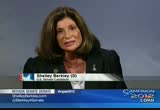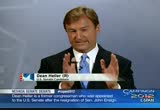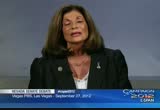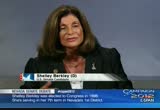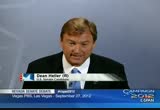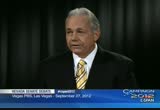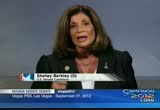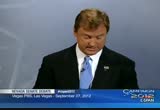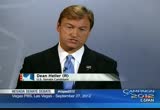tv U.S. House of Representatives CSPAN October 1, 2012 12:00pm-5:00pm EDT
12:00 pm
so i do use argument as a way -- not always, but sometimes -- as a way to float some ideas and hope some or one or many of>> y. maybe talk a little more about how that works. it is completely private. not even clerks participate in that. what happens in conference? >> it is just the nine of us. as you said, there is nobody else in the room. it is actually one of my jobs, as junior justice -- i have two of jobs that have to do with the fact that nobody else is in the room. every once in awhile, there will be a knock on the door, and the junior justice has to scurry up and get the door. that is when some justice has left his notes back in his office, or some justice has forgotten her reading glasses, or something like that.
12:01 pm
i myself think it is a hazing ritual, really. so that is one thing i do. the other thing i do is i take careful notes, because i am the person who has to communicate to the clerk's office all of our votes. whatever we do, i have to make sure that i write it down so that i can tell all the people around the supreme court that have to know in order to issue orders, and things like that. but the way we do it is we all sit around a rectangular table. we sit in order of seniority. the chief justice is at the head of the table. actually, the senior associate justice, justice scalia, sits all the way at the opposite end. then, it goes around by order of seniority. on my left is justice scalia.
12:02 pm
on my right is justice sotomayor. the chief justice will start. he will say, "we heard smith the jones a couple of days ago. you remember this case about," da da da da. he will talk a while and say what he thinks about the case. he will provide a vote. all of our votes are tentative, in the sense that we do not stop thinking after we say them. but he will say, "i vote to affirm because," and he will give his theory of the case. it will go around the table, with each person talking, until
12:03 pm
it gets to me. there is a rule that nobody can speak twice until everybody speaks once. if he speaks in the ninth position, that is a very good rule. you want to maintain that. sometimes, that is it. sometimes, everybody thinks, we have said everything we have to say. other times, it will be clear more conversation is called for. that is true if you have a fractured court. people will try very hard to try to keep talking until some kind of majority emerges. in other cases, there will be times when people will want to respond to things that another justice has said, will want to say, "that strikes me as right," or wrong, or a good understanding, or a bad understanding. people want to debate. people want to raise questions about what each other has said. sometimes, the conversation after the initial go-around can be fairly expensive.
12:04 pm
other times, we have all said what we said, and that is enough. >> is the conference on a particular case the only time the court will, as a whole, sit together to discuss the case? the you ever think, can we get back together again and talk more? >> occasionally, that happens. usually, the first conference is pretty much the only conference. the rest of the discussion will take place after a draft opinion is issued. then, there will be a lot of discussion about the draft opinion, most of it on paper, but some of it in subsequent conferences. the chief justice will say, "justice kagan has circulated an opinion. i see four people have not voted. why is that?" we can talk about the issues. sometimes, we continue the discussion in conference after
12:05 pm
a draft circulates. sometimes, we do that on paper. but our rules are informal enough so that if somebody wants to bring something back to the conference -- we call the nine of us "the conference" -- if somebody wants to bring something back, we can do that. our rules are not so rigid that somebody who feels more conversation is needed would not have the opportunity to do that. >> although much of the press tends to focus on when justices disagreed, in some cases, what is so exceptional is that you can get even five extremely smart but very independent thinkers to all agree on the same wording about a complicated issue.
12:06 pm
>> we do agree on things more than people know, and more than we are given credit for. many of our opinions are unanimous. many of them are 8-1, 7-2. as you say, even the ones that are just five of us require a number of people to come together and finally agree on a particular way to solve a problem. that sometimes takes a lot of back-and-forth and give and take. i do not like this footnote and i want another footnote. why don't you change the way this analysis goes? i think that is good. i think it improves opinions, for the most part. also, in order, finally, to have the product of "the court" -- and i think it is very important that we strive always for a single opinion which
12:07 pm
represents the court's view. sometimes, we do not manage to do that, and i think it is a problem for lower courts and for lawyers. to do this, you have to give up the notion that every opinion is going to be the way you would have written the opinion. that is never going to be the case. i would write a different opinion from every single one of the other justices on every single one of the cases. in the end, you have to figure this is a team. this is an institution. we are called upon to do our work collectively. you cannot insist that every opinion be exactly the one you would have written. >> there has been discussion over the years about the role of clerks in the court, and whether there are a lot more footnotes because clerks are looking for things to do, or justices are looking to give them jobs.
12:08 pm
can you talk about how you use your clerks, and whether that is different from, your role when you clerked for justice marshall? >> i think the clerks are great, and a boon to the institution. i can only -- i suspect each of us uses them somewhat differently, so that there is variation among the members of the court. but any notion that the clerks are the important people in that building, in terms of the votes and the basic reasoning, i think is wrong. i was going to use a stronger word, but i will just put it like that. the one thing the clerks do for us that is absolutely essential is help us pick cases. we get 8000 or 9000 petitions
12:09 pm
every year, and we take fewer than 100. the process of how you go from 9000 petitions to 100 cases -- at least i could not read 9000 petitions and figure out what are the issues and what are the arguments, and how important are the questions here, and are there any -- what are called vehicle problems. even if the question is important, this is not a good case to resolve that question, for various reasons. the clerks do a lot of work for us in that respect. for every petition, eight of us are in something called the circuit pool. that means one clerk from any chamber would get a petition and will write a memo about it, saying what the decision below said and what the claims are, and whether the claims are of a kind that we would want to
12:10 pm
address. those memos can run from a page to 30 pages, depending on the complexity of the case. we all get those memos, and they help us decide if this is a case we should take. the petitions that i read myself are the ones where, when i look at the memo, i say, that seems pretty serious. that seems like somebody is going to want to discuss the case. and i will go back to the petition. one justice is not in the cert pool, but i am sure he uses his own clerks to review the petitions. the clerks are very important in that dimension of our work. the court's help me in a variety of other ways as well.
12:11 pm
i talk with them about the cases. a talk with them before and after argument. i find i always learn something from what they tell me, and learn something from having a conversation among a group of people. the way i do it -- some justices just have one clerk for each case, but i try to talk to all my clerks about all of the cases, because i want to hear a range of points of view. that, for me, is the most helpful thing about the conversation, is to some ways be part of an argument and discussion about the important questions in a case. i will use my clerks in an opinion-writing as well. i write all my own opinions, and it remains really important that an opinion sounds like me. i am quite sure that i have cut
12:12 pm
clerks who are better writers and i am, but it is not the way i write. for me, i do not think through a problem until i write through a problem. it is very inefficient, but i cannot think all the way through about a problem until i write it down. but i will have my clerk to a draft opinion, because it helps me see what arguments work and do not work, what i like and do not like, what order seems to make sense or not make sense. i will put it on one screen, and then i will start a new document on another screen. so i find that even though i am sort of starting anew that the draft helps me orient myself, to see what works and does not work.
12:13 pm
that is another thing clerks do for me. i know my clerks improve the work i do enormously. i suspect my colleagues would say the same. they are by no means junior varsity judges. but i think the help us do our work a lot. >> you come out of writing, and have your own distinctive voice. others have observed you have a distinctive voice. it was written "in the new republic," justice scalia's newest colleague is giving him a run for his money. do you have a sense of your own style? you have been described as having a bit of a colloquial twist. do you do that consciously? >> there are some terrific
12:14 pm
riders on the court, so it is nice of jeff rosen to put me in that company. i am not sure i deserve to be there. i think hard about how to present an argument. this is not so much style. but it is -- both of us have spent a lot of years in a classroom. i approach opinion writing like a used to approach class preparation. there are complicated ideas i want people to understand, and they do not know that much. how do i help people understand this complicated set of ideas? i would think hard about how to break it down so people can understand it, or how to use analogies or hypotheticals that people can relate to, so they would understand the main point.
12:15 pm
all those techniques i tried to use when i was teaching, to get people to understand really complicated things, and to communicate those ideas in a way that stuck with people, in a way people could grasp and remember -- the way to do that is often to try to use examples and hypotheticals and analogies, and try to break down a problem into its component parts and show how one leads to the next. i try to think like that, when i sit down to write an opinion. in terms of the style, i try very hard to make it understandable to a broad audience. sometimes i think, why am i trying so hard to do this? some of my opinions are not going to be read by a broad
12:16 pm
audience. most of my opinions are going to be read by a fairly select, a specialized group of lawyers. i think even for those people, you know, if you can write an opinion that anybody can understand, you make it all the more useful and usable, even in a sort of specialized, lawyerly world. i try to explain what i am doing clearly and comprehensively. sometimes, as you say, i find one of the ways to do that is to be a little colloquial. i am not a fan at all of legalese. i try to express things in the way people would express it in normal conversation.
12:17 pm
sometimes, those are the things that seem the most vivid to people, and that people can grasp hold of most easily. i do not think i set out to right colloquially, but sometimes i will think that some colloquial expression is the best way of explaining what i think about sometng. >> do you have a different audience in mind for majority opinions than for a dissent or concurrence? to you approach them with a different mindset? >> i do not think of a different audience, but it is certainly a different enterprise to write a dissent.
12:18 pm
in part, you are writing your own views, but in part, you are critiquing. that is another form of writing. when you are writing for a court -- this goes back to the use of colloquialisms and vivid language. when you are writing for a court, you can do some of that, but you cannot go to town with it. even though in the end it says justice kagan, it is an opinion of the court, and everybody else has to be comfortable signing on. you have to write a draft people are comfortable signing on to. as that draft circulates, things are left on the cutting room floor, because it turns out other people are not so comfortable. those are some of my favorite lines, actually. one of my favorite colleagues does not like it, it is gone. when you are writing a dissent, even if you expect other justices will join, you can be more yourself.
12:19 pm
sometimes i feel that. i sit down at my computer and am writing a dissent. you have this feeling like, now i am being myself, in a way maybe you are not when you are trying to write for the court. >> the same with a concurrence? >> the truth is i have not done many of those. this is something i am thinking about and will continue to think about. i am sure there are times when i will think i really need to write separately, even though i agree with the decision, or even the opinion of the majority. concurrence can be either you vote with the majority but say something separate, or you do not vote with the majority.
12:20 pm
i tend to think it is good for the court to speak as a court. i can think it is a problem, as i said before, when we are factored. i think it is a problem when every single one of us has a slightly different view of the matter everybody has to try to figure out. we have this opinion and that opinion, and what are the differences? for the most part, i have tried, where i can, to join my colleagues, rather than writing separately. there is a place for writing separately. there is a very valuable role concurring opinions can play. but at least at this stage of my tenure, i think it is important -- i like being part of an institution and part of a team, and where i can joining what my colleague has written for the court.
12:21 pm
>> as an academic, you wrote about supreme court opinions quite a lot. as a member of the court, do you read the academic commentary on the opinions you have written? >> i do. not religiously. i do not sit down and write an opinion and immediately set a google search. >> go look for the reviews. >> right. but people send me things, and i take a look. i continue to keep in touch. i would get various law reviews and look at what is being written. i look at some of the legal blogs on a pretty routine basis. pretty much every day, i will look at scotus blog, supreme court of the united states. or there is a blog called "how appealing." there are a variety of blogs,
12:22 pm
written by law professors. some are more conservative and some are more liberal. i will look at those every once in awhile and see what people are saying and thinking and writing about legal issues. i find them interesting and occasionally useful. you know. it is the world i come from, as you know. i am not going to say, i am never going to read the law review article again. >> do you read them before, as you are trying to sort through cases? >> usually only when the briefs point them out. i rarely do an independent search. >> you talked about the role of clerks in sorting through the cert petitions.
12:23 pm
in recent years, the court has taken many fewer cases than it did in an earlier area. -- earlier era. maybe there are fewer circuits and fewer important issues, but that seems unlikely. do you have a sense of whether the court is taking the right number? >> the truth is, i do not know if it is unlikely, for this reason. i tend to think that all of us, in the abstract, would say we should take more cases, that we seem to be at a fairly low number, especially compared to what we have done in the past. when i clicked on the court, we did about twice as much as we are doing now, something like 140 cases, and now we are doing something like 75. i think people who were there then would have said 140 was too much.
12:24 pm
but 75 seems low. i think a number of us have said that, at various occasions over the years. at said, i cannot tell you we are leaving much on the table. every conference, i will think we should take more cases. are we leaving much on the table? maybe, but i do not have -- it doesn't strike me that there are tons of cases that we should be taking. it seems we are taking most of the important ones. it seems we are taking most of the circuits. i do not know exactly what has caused it. >> one component of that is some commentators have observed that the solicitor general's office has filed petitions at a much lower rate than 30 years ago.
12:25 pm
mid-1980's, they petitioned for about 200 cases a year, and now it is less. as solicitor general, that was one of your duties, to decide what cases to petition on. did you have a philosophy at that point as to what your role in making the initial sort in the case -- >> i never did check the history of our time, and what solicitors general in the past were asking in the past. and it seems to me that we would file a petition when an important interest of the united states with an issue. i do not recall all that many occasions when we would say, no, let us not take this to the
12:26 pm
court, because even though it is really important -- what? i do not know. if we thought something was important, we would file a petition. the court grants the solicitor general petitions. not always. there was one we filed where the issue in the case would only come up in a couple of circuits. it wasn't an issue about oil royalties. -- it was an issue about oil royalties. i do not even remember what it was. it was in the fifth circuit, where a lot of offshore oil drilling was. it was not good to come up in a -- not going to come out in a lot of different places in the united states. and it was an excruciatingly boring question.
12:27 pm
but -- here is my but. the but was, it was a question on -- i think this is the right figure. the u.s. treasury was coined to be either $30 billion richer or $30 billion poorer, and that seems like an important interest of the united states. the court did not take it. what does it cost to get your petitions granted in this court? that is one of the only times i can remember where a petition we filed was not taken. i think it was probably just too boring to take. i am sure there is a better reason. >> shifting gears, the work of the court must occupy a great deal of your time. do you have any opportunity for reading outside of what the court does? what is on your nightstand? >> i do try to read. i read a little bit more in the summers than during the term. i read a variety of things. i read novels. i read history, biographies, other kinds of history. when you show up to these things, everybody gives you gifts, and they tend to be
12:28 pm
paperweights. but you gave me the president of the university's book on reconstruction. that was great. you know, it is interesting. the history i am reading right now is a book about lincoln. and the novel that i am just wrapping up is two great novels by a woman called hillary mantel, the british novelist. one is called a "wolf hauled," and the one i am just wrapping up is called"bring out the bodies" is about thomas cromwell, in henry viii's time. they are magnificent historical fiction. i would recommend them. >> you have graciously agreed to take questions from the
12:29 pm
audience. a few ground rules. we will take questions from students, faculty, and other guests. not from the press. not a press conference. it would not be appropriate to ask the justice about cases pending before the court. i assume you all know that, but just a reminder. let me open it up to questions from the audience here. visit the microphone. or from our faculty. >> thanks so much for coming. you clerked for thurgood marshall. i am wondering, what is the most valuable thing he taught you? >> i am not sure i can pick one. it was an extraordinary year. i think a supreme court
12:30 pm
clerkship is special for anybody. you are in your late 20's, early 30's. you walk into this magnificent building every day, and you are surrounded by -- your job is to think about the important legal questions of the day. it is an extraordinary job for any young person. to clerk for justice marshall, who was one of the iconic figures of american law, i think the greatest lawyer of the 20th-century, i felt so privileged and so blessed to be there. one of the great things about justice marshall was he was an incredibly good storyteller. he had lots of stories to tell. he had lived a very eventful
12:31 pm
12:32 pm
listening to him talk about his choices, and the influence he had had, was one of the high points of my life. >> please come -- just come use the microphone. >> thanks for being here. i am part of the children's defense clinic here at richmond. we recently read miller v. alabama. what do you feel about the treatment of juveniles in the justice system? to their need to be any changes? >> the way i view my job is actually to decide cases, and not the state lots of views about, here is what i think about penal reform, or here is what i think about children in
12:33 pm
the justice system. there are a range of legal questions that i might have views about, but in the end, it is really -- that is not the way i conceive my role. i conceive my role as a judge to decide particular cases, and the issues in those cases that come before me. in miller and jackson, speaking for five members of the court, i addressed one of those questions, which was a question about mandatory life without parole sentencing for juveniles. as my vote reflects, i thought mandatory life sentencing for juveniles is inappropriate, and the justice should have discretion to decide whether it
12:34 pm
is life without parole or some lesser penalty. in signing that case, i am not deciding, and will not decide, a range of other issues about juveniles in the legal system that might or might not come before me. if they do not, i will never consider those questions. if they do, i would think hard about the individual question presented. >> thank you. >> i want to pick -- someone else? go join the microphone, so i know who is there. >> alex sort of stole my question. just kidding. thanks for coming. this is related to that. if i can quote you from miller versus alabama, if that is ok --
12:35 pm
>> let me observe i do not think it is useful to quiz the justice on what exactly she wrote. >> no quiz. sorry. you wrote that mandatory life without parole for a juvenile precludes consideration of his immaturity and failure to appreciate risks and consequences. my question is regarding juvenile transfer statutes. you may give the same answer. >> i am going to give the same answer. that is really not my job. what a legislature does -- that is for a legislature to do. the role of a judge is very different. sometimes, a judge is going to have to interpret a statute. that type of statute, like any other type of statute. other times, a judge has to determine if a statute conforms or does not conform to
12:36 pm
constitutional requirements. as to what makes for good criminal justice policy, the kind of juvenile transfer statutes to have -- i view that as a very different question than the question i am answering, and a different role to be performed than the role i have. >> thank you. >> slightly easier question. fall semester, we have to take three basic courses -- property, civil procedure, and torts. not to say that any class is not important -- >> civil procedure is the most important. >> thank you. >> i am saying that just for dean perdue. i thought that would be dean perdue's answer. but i also used to be a civil procedure teacher, so i kind of
12:37 pm
agree. >> thank you very much. [laughter] >> hello, justice kagan. let me adjust -- it is a burden. >> justice marshall used to call me shorty. that is when he was in a good mood. when he was in a bad mood, he called me knucklehead. sorry. go ahead. >> i have a question regarding your views on women in a man's profession, and how you think it has changed over the years, and how you see the role of women in the future, especially having a number of women on the supreme court and a lot more
12:38 pm
women involved in the profession in general. >> i do think it has changed enormously, and it has changed enormously for the better. i am reminded of this all the time. there are four women justices, four women who have served as justices of the supreme court. it is two of one generation and two of another generation. justice o'connor and justice ginsburg, and then there is a real gap between justice ginsburg and justice sotomayor and me. it is probably about a 20-year gap, or a 25-year gap, between those two and the next two. when you think about the careers that they had, and the obstacles they had to surmount, and then you think about the careers that justice sotomayor and i had -- not to say there were not challenges.
12:39 pm
not to say there were not times when one had to prove oneself in a way that a man might not, but nothing like they dealt with in their lives. justiceo'connor and ginsburg, they got out of law school, they could not find a job. people were may be willing to hire them as secretaries. kobe my secretary. i have a law degree. but aren't you a girl? if you look at the changes that happened in the legal profession over those 25 years, it is quite extraordinary.
12:40 pm
12:41 pm
justice o'connor, i know, talk about this. she is coming to the court room on occasion this year, to see some cases she is interested in, or see her former clerks arguing cases. i heard her talk about it. she contrast did it to when she was the only woman on the court. now, the way we sit on the bench, i sit on one side of the bench and justice sotomayor sits on the other side, and justice ginsburg sits in the middle. so there are women's voices coming from all over the place, and none of us are shrinking violets. there really are women's voices coming from all over the place. sometimes, i look out, and there are a lot of school groups that come to the court. i think that is a great thing. it is a great thing for girls and a great thing for boys to see women on this bench, doing the same job in the same way as men do. you could have another, or another, or another. you know. >> will anyone in this room get to see the era when there will be five women justices? >> i think five is do-able. what do you think? i think nine might be a stretch, but i think five is do- able. that says things about the society we have become. i do not think it is important at all. i am glad to be a small part of it. >> i think on that note, we will bring this to a halt. >> thank you very much. this was a real pleasure. [applause] >> termination cheat in trade, and china has cheated, i will do something that the president has not done, which is labeled them a currency manipulator. >> we brought more trade cases
12:42 pm
against china and one term than the previous administration did in two. by the way, we have been winning those cases. >> president obama and mitt romney meet in their first presidential debate. watch and engage with c-span, with our live debate preview. fallen by two ways to watch the debate at 9:00. on c-span, both candidates on screen the entire debate. and then on c-span2, multiple angles. in about 15 minutes, we will go to the newseum here in washington where the national communications association held a panel with communications scholars on how to watch the debates, what viewers should look for. live coverage begins at 1:00 eastern.
12:43 pm
tonight, we continue our live campaign 2012 coverage. three congressional debates to show you. we will go to the university of massachusetts for a debate between incumbent president scott brown and elizabeth warren. c-span will have coverage of that. that will be followed at shinnecock by -- 8:00. c-span2 will have eric cantor as she squares off against a former army colonel when powell. live coverage at 7:00 eastern on c-span2. "usa" richard walsh sat down with an interview with ross perot. c-span cameras were there to record the interview from his home and office in texas. he talked about running as a third-party candidate, dealing
12:44 pm
with the country's debt, and the u.s. education system. here is a look. >> go to our most elite engineering schools. at one time we had more talented engineer than anyone else. we were discovering everything in the world. now that has all turned around. and it is getting worse by the day. 78% of the people getting ph.d. is in our most elite engineering schools come from either china or india. ok? now, 20% come from all over the world. now i'm up to 90%. that means 2% of the people getting phd's are coming from the united states and our most elite engineering schools. that is a recipe for disaster. we do not ever talk about it, we do not do anything about it, we just let it unravel.
12:45 pm
>> you can read the article in today's "usa today" about the interview. watch the interview tonight at 9:00 eastern here on c-span. coming up at 1:00, a discussion on how to watch the upcoming presidential debates this wednesday. live coverage once it gets underway. right now, we will hear from another third-party presidential candidate to join us on this morning's "washington journal." what do you bring to the table? >> how about truth for starters. the notion that both obama and romney are arguing over who is
12:46 pm
going to spend more money on medicare would need to have a reading debate and discussion on this country on how we slash medicare spending because if we do not, i believe we will find ourselves in the midst of a monetary collapsed as a result of continuing to borrow and spend money to the tune of 43 cents out of every dollar we spend. host: so what do you see on that particular issue? what is your prescription? pardon the expression. >> i oversaw the or form of medicaid in the mexico when i was governor of new mexico. we ticket from a fee-for- service model to a managed-care model. we saved hundreds of millions of dollars, set up better health care networks for the poor. i believe if the federal government would have a lot granted the state of new mexico 43% less money, and done away with all the strings and the mandate, i could've effectively oversee the delivery of health care to the fore. i think you apply that same
12:47 pm
template to medicare, health care for those over 65, get the federal government out of the health-care business completely , give it up to the states, in this case, block grants that balance revenues and expenditures, and that is how we ever get out of this. giving it up to the states, 50 laboratories of innovation and best practices, that is exactly what we will have. we will have some fabulous success and some horrible failure. failure of lincoln avoided, success will be emulated. that is how we will find our way out of this. host: gary johnson is with us from new mexico. he will be with us for about 40 more minutes. we will put the phone numbers on the bottom of the screen as we take a look at the libertarian nominee and his race overall. there is a recent gallup poll that shows americans are split on the need for a third party.
12:48 pm
pretty much split. what is your argument for a third party? guest: in this case, i will argue that i am not the third choice but the only choice. in this case, i am on the ballot -- will be on the ballot in all 50 states. right now we're on the ballot in 47 states and the district of columbia. litigated in the other three. although there are a part of a third-party candidates running this cycle, none of them are going to come close to what i just said. that said, where is the difference between the two? i'm going to argue that we should not on iran, we should get out of afghanistan tomorrow, bring the troops home, marriage equality is a constitutionally guaranteed right. legalize marijuana now. i would never have signed the allowing citizens to be detained without being charged.
12:49 pm
i would not have signed the patriot act. i think homeland security is a terribly redundant. tsa should be airlines, states, municipalities. balance the federal budget now. not we're doing is sustainable. the day of reckoning is close. a monetary collapse is one the dollars we have in our pockets do not buy a thing because of the accompanying inflation. front and center are jobs. i will be the only candidate advocating eliminating income tax, corporate tax, abolishing the irs and replacing that with one federal consumption tax. i embrace the fair tax. i think that is the answer to jobs.
12:50 pm
if the private sector does not create tens of millions of jobs, i did not know what it will take to create tens of millions of jobs. it is the entry to china. i see manufacturing jobs flocking back to the united states. are you hearing these things from these other two guys? no. they are arguing over who will spend more money on medicare. romney said he wants to increase spending for the military and balance the budget. it doesn't add up. i guess we believe in santa claus and the easter bunny and i do not think they are coming. host: gary johnson is with us and will add a third line for
12:51 pm
third party voters. we will get to your calls in just a couple of moments. what is the strategy for the rest of the election? guest: right now there is a lot of attention that is being drawn to what it is that i am saying. i'm being recognized for being at 6% nationally. i'll ask you an obvious question that has an obvious answer. are you hearing my name six times for every time you hear obama or romney's name 100 times? if my name was just being mentioned in line with where i'm calling, i think my 6% would be 14% and i would be the next president of the united states.
12:52 pm
host: gary from pittsburgh. caller: i saw your debate about three months ago. you really nailed him to the wall. he looked kind of stupid. i was reading a lot about the democrats and republican party. the campaigns of obama and romney are similar. read the history about them and the trilateral commission. they are controlling both parties. that is a scary thing. i really respect your issues and i think you're knowledgeable. independent parties are being played by ron paul.
12:53 pm
i wish there was more strength for you. i just wish you well as you continue to -- guest: thank you. host: gary johnson. guest: when i entered into the republican race for the nomination, i thought it was going to be hard to marginalize two candidates onstage talking about the same thing. i am talking about ron paul and myself. i found myself excluded in ways that are unfair. this country was not when i believe to be what it was. it is a system that is manipulated and different than my experience running for
12:54 pm
governor of new mexico. running for the republican nomination for governor in mexico, the republican party in new mexico was very inclusive, including me in all the debates and discussions. they made me part of the process believing the eventual nominee would be stronger as a result of more oysters. host: gina, good morning. caller: yes, good morning. thank you for running. i was a ron paul supporter. you know, you are right on on all the issues and on the war. i do commend you.
12:55 pm
you can look up on my friends page and see all these articles. he's to work for ronald reagan. is there a way -- are you doing anything to get into the race cycle with obama and romney? host: what do you say? guest: right now i'm excluded from the first debate. the commission is the presidential debate commission and that is private and made up of republicans and democrats with no interest in seeing a third voice on stage. we have filed three lawsuits to get me on stage based on other third-party candidates who have filed lawsuits.
12:56 pm
there doesn't seem to be much hope. we filed on the antitrust round, something that has not been done before. host: how much do these debates matter and what are you looking for to hearing on wednesday? guest: the debates are tantamount to me having a chance of winning. you can close the lid on winning the election. is winning getting enough votes to cause one of the other two who ends up winning to give more than just lip service to these issues? potentially. i view this as a victory every single day. there are so many people -- i
12:57 pm
think i speak on behalf of the majority of americans. i think they consider themselves fiscally responsible and socially respecting. i am in that broad brush category myself. how does that equate to all the issues that we face today? i do not think either party -- i don't think democrats are good on civil liberties. i don't think republicans are good at dollars and cents. when it comes to civil liberties and being republican, it is not happening at all. host: you might remember john anderson won 6.6% of the national vote. ralph nader has won several times.
12:58 pm
you have been called the original tea party candidate. i want to play a little bit of tape with ross perot. we will show this interview tonight at 9:00 p.m. he reflects on the tea party movement. let's take a listen. [video clip] >> i'm wondering what your thoughts were with the tea party revolution. >> it was interesting to see that happen. i was surprised. i think it had managed in impact, don't you? i think it was a healthy thing to happen. hopefully a lot of american citizens.
12:59 pm
host: what do you make of the tea party movement? guest: the notion of dollars and sense that we have to balance revenues with expenditures -- initially it was all about spending. i am an line with that. talk about the occupied movement. it is about the inequality that exists in this country. i don't think republicans and the difference between corporate welfare and free markets. democrats, the same way. by adopting the fair tax, i think we kick half of those issues in the rear end. pink slips get issued to half of the lobbyists. host: here's a comment along wi. ihost: gary johnson writes if
1:00 pm
this election cycle is ross perot, he will help obama get a second term. what do you think? guest: in four states they have put this to the question. >> you can see the rest of this interview on our web site. like now to the museum in washington where a panel of how to watch the upcoming presidential debates. -- live now to the museum in washington where a panel of how to what the upcoming presidential debates. >> beyond wins and losses, assistants guide to the 2012 presidential -- presidential debate. we think it will be very helpful to the public and beyond. a very helpful partnership we
1:01 pm
have developed with regard to our own our region initiatives. -- outreach initiatives. it is very much a part of the mission here in the museum, and we believe those of you who a civicill get us of it education does walking through the halls. we're very pleased be part of this program. i will turn it over to you. >> good afternoon. think you for joining us today. my name is nancy kid, executive director of the national communications association. and on behalf of our almost 8000 members i am pleased to welcome you to our discussion. i would especially like to thank the first amendment studio center for welding -- welcoming us. given the various ways in which communication scholarship can be
1:02 pm
useful to our citizenry from interpersonal relationship to political engagement, one of the core components of the national communications association mission is to facilitate the dissemination of disciplinary scholarship to a public audience. there are a few activities more important to the welfare of our nation than informed of voting, and we hope this event will serve a concept in the vital practice. it is my pleasure to introduce you to our senior moderator. mr. paul kosinski. he is a veteran journalist. co-author of the weekly national column and said the first amendment. his first presidential campaign assignment was george wallace. as he campaigned in the midwest in 1968. a founding editor of usa today,
1:03 pm
washington editor when it began in 1982. of panelists and a member of gubernatorial and senatorial debate. we're so glad he is guiding our discussion today, and i hope you will join me in welcoming him. [applause] >> thank you. again, we're very pleased to partner with the national communications association to sponsor this. after years of campaigning, caucuses across the nation, 27 republican primary debates that began in may 2011, here we are. today's before the first of three president of the bids and one vice presidential meeting. the first debate between the democratic and republican candidates takes place wednesday at 9:00 eastern time. the debate will be of the university of denver featuring the president barack obama and
1:04 pm
the challenger mitt romney. this happens every four years. we enter the final hours before the state -- before the debate. we later put them into perspective that we're going to try to do that. there is the rest of news reports over the weekend and this morning telling us how vital the debates are. we're here to offer a thought today on really helping all of us citizens on how to watch these debates and how to evaluate to start off with. the analysis may be the only certain thing we know about the debates of this point. we hope to go further than that. and assist you watching today in the studio, watching on c-span and live streaming to develop tips and tools to watch the debates. television debates began in 1960
1:05 pm
with john f. kennedy facing vice-president nixon. the next debates were not until 1976. a commission was set up to run the debates. at town hall format was introduced in 1992, which will be the format for the second debate. -- a town hall format was introduced in 1992. that will take place october 16. the final debate returns to the moderator and candidates on october 22 at lynn university of florida. on the panel today to discuss going beyond winning and losing, and we will move from my immediate left, correspondent of the new york times, abc news and nbc news and participant in the first televised debate in 1960 in chicago. and the grower, washington post contributing writer. ndy grower "
1:06 pm
washington post" contributing writer. michael hogan. charles mack gokalain. catherine olsen, univ. of wisconsin milwaukee and director of the schools frederick program. thank you all for being with us today. we will begin the program today with a bit of advice for those of you here in the studio and those of you watching for following this on twitter. when we go to questions, there are two microphones and hope you will come down to those. if you are following us on twitter, and you have a question, we have ncadebatess12.
1:07 pm
we will try to field questions from there as well as in the studio. from thech a clip moment u.s. the question of the outset. >> mr. vice president, this is a question of executive leadership and a very important campaign issue, our like to follow this question. republican campaign slogans say it is experience that counts. implying you have had more governmental executive decision making experience than your opponent. president eisenhower has asked to give one example of a major idea of yours that he adopted. his reply was "if you give me a week, i might think of one. i did not remember." that was a month ago and he has not brought it up cents.
1:08 pm
i am wondering if you could clarify, the one put out by republican campaign leaders or the one put out by president eisenhower? >> i would suggest that if you know the president, that is probably a prestigious remark. as far is his statement is concerned, i think it would be improper for the president to disclose instances in which members have made official statements to him that he is accepted or rejected. the president has always maintained, and very properly so, he is entitled to get what advice he wants from cabinets and other advisers without disclosing that to anybody, including the congress. i can only say this. through the years i have sat on the national security council. i have been in the cabinet. i have met with the legislative leaders. i have met with the president when he made a great decision with regard to levitan and other matters. the president has asked for my
1:09 pm
advice, and i have given it. -- i met with the president when he made a great decision with otherds to levbanon and matters. the president only makes the decision. all his advisers do is to give counsel when he asked for it. as far as what experience counts and whether that is experience that counts, that is not for me to say. i can only say my experience is there for the people to consider. >> the world has changed a great deal since you and other correspondents based candidates in terms of how journalism and candidates approached the campaign. but you ask the question again and that way? -- would you ask the question again in that way? >> i would because it was passed and a great way. it was asked by charles mohr.
1:10 pm
it was a legitimate question. >> it was a legitimate question, because that was the line on the part of the republican party and richard nixon. and though my colleague from cbs and is referred to their had has asked, i did not feel richard nixon did a complete answer. he referred to me as a non- essential question or some words of that effect. he did not answer it well. it stuck with him. it was the party
1:11 pm
he was confused of not having the confidence of president -- of president eisenhower, because of a great way that is what the republican line was, experience that counts. >> you were free to pursue that question, right? ofno vetting questions. i heard about the debate the day before when i was covering nixon and the south. i got on the train that went to chicago, and went in on the following monday to go wbbm c affiliate in chicago. we sat in a row, and all we did was introduce ourselves to the
1:12 pm
camera. our producer went on to produce "60 minutes." that was it. >> in that clip richard nixon looks very confident and gave you a long answer. clearly anticipated some part of this. what we remember was the recollection that he was sweating heavily, nervous and prepare. you were in the room in that particular format. what did you see from your seat? >> i was in the room. i saw kennedy in a dark suit. i learned later he got make up at the last minute. i saw nixon in a gray suit in front of a great background. from time to time in the debate i did not see excess of sweat. i saw little, tiny beads of
1:13 pm
sweat from time to time. there were old friends when they were in the house of representatives. they were cordial to reach other. i just think, and this is subjective. those who watched it on television kennedy had won. those who heard it on radio, thought nixon had won. -- those who watched on television thought kennedy had won. >> let's move on to a little bit later debate. the comeback of the fixture and our political campaign. there is a commission to set up the debate. let's watch the clip from 1998. >> over the years you have expressed several positions while posing -- while opposing nearly all forms of government payment for it. you now say you support abortion
1:14 pm
only in the cases of rape,, or a threat to the mother's life -- incest or threat to a mother's life. if abortion were to become illegal again, the you think the women who defy the law and have them anyway, as they did before it was ok by the supreme court and the doctors who perform them should go to jail? >> i have not sorted out the penalties, but i do know why it opposed to abortion. i favor adoption. aw we can get this lot changewe changed, where we can get everyone to take the kids better sometimes unwanted and aborted, take them and put them in a family that will be loved. my position has evolved. it is continuing to evolve. it is evolving in favor of life.
1:15 pm
i have had a couple of exceptions i support. rape,, the life of the mother. sometimes people feel uncomfortable talking about this, but it is much clearer for me now. i've seen abortion used sometimes as a birth control device. the millions of the killings accumulate. this is one where you can have an honest difference of opinion. we certainly do. now i am for the sanctity of life. >> from your experience asking that question in that debate and serving on the panel uncovering debate subsequently, how do the rules and realities of these debates impact or to some degree in have been getting a full exchange between the candidates and with the voters? >> for starters, we were told we could have follow-up questions.
1:16 pm
the way it works is the vice president gave his answer. michael would question and he would answer the question. for me to stop as you would naturally in an interview and say to whoever you were interviewing, could we go back? you know, you have had 15 years to sort this out, so would you please answer the question? it would have been a little more polite than that. he ducked the question, and it goes on today, because as we saw on the and this republican primary debate season, at some point john king from cnn was asking each of the candidates to please describe the one area in which each of them is most misunderstood, and when the question came to mitt romney, he basically said you get to ask questions you want, and i get to give the answers i want.
1:17 pm
we're seeing a lot of that now. it does not matter what the panel has asked of the candidates, but under this format the canada it will tell you what ever he or she wants to say and what ever point to have made at this time. we sometimes sit there like props. the debate system was described by a man from abc to is trying to promote union-style debates with the candidates go after each other as a job interview with the moderator is basically the guy from h.r. or woman from a charge during the interviewing. i think this debate, the debate wednesday night has a different format. it is 90 minutes on one topic. my debate was 45 minutes on domestic corn policy. we ran long on domestic.
1:18 pm
and that is what we started with. i am told jim bakker was backstage yelling and up of this, let's move to form policy, because that was perceived as bush's strength. the idea you will have 90 minutes on wednesday on domestic policy only is a huge improvement. you have a moderator who could and get them ton th move off the loop, if you will. >> i think it will be an interesting moment because we are seeing international questions raised, the handling benghazi. in th it will be interesting to watch the moderator from cbs. >> the most important foreign- policy debate between nixon and kennedy were islands off the main island of china.
1:19 pm
those of us on the panel, we thought there were possibly an oriental dance team. [laughter] >> you heard it here. >> let's take a look at another clip from 1988. >> governor, it kiddy were raped and murdered, would you favor an irrevocable death penay for the killer? peacoat know, i do not. i think you know i oppose the death penalty during all of my life. i do not see any evidence it is a deterrent. i think there are better and more effective ways to deal with violent crime. we have done so in my own state, and one of the reasons why we have had the biggest drop in crime of any industrial state in america and the lowest murder rates. we have work to do in this
1:20 pm
nation. we of work to do to fight a real war that the phony war. -- we have work to do to buy the real war thanot a phony war. we have much to do to step up the war. >> some say that these debates are not really debates, but joint press conferences. the answer was seen somewhat determining the outcome of the election, but what they use it to people who say candidates respond with a sound bite rather than a real answer. >> this is an example where the canada it is changing the subject and were sympathetic to him. he had good reason to do it. this is an awful question.
1:21 pm
it is not just tasteless, but gotcha journalism. it does not inform the public in any way. he is on record having opposed the death penalty his entire career. he can say and that case i would change my position. then the have lots -- headline is he is the foot locker. instead the answers i would stick to my position on this. then the headline is he is the passion wa passionless flirt. as it was. we will get back to that, as i think is the way to go. i do not blame him for changing the subject. >> there was the criticism of responding in a policy fashion
1:22 pm
by either being outraged were responding in a personal matter. from our rhetorical standpoint of what to do when faced with the question, what should one do? >> that is the third option, and that is to criticize the question as newt gingrich did very effectively in the republican primaries when asked about marital problems. >> it could have said i would kill the son of a -- [laughter] >> one of the purposes of the debate was to actually try to learn something about the candidate you do not already know. what we argue about him is vacation reading included swedish land use planning. i agree absolutely with sandy. i would have wanted to kill him, but we are a nation of laws.
1:23 pm
he apparently had a brother that was killed in an automotive accident and another relative who was mugged. as of was that question was and of prepared as he was, that is the nature of the presidency. things will happen for which you are not prepared, and i thought it may have been an unfair glimpse, but it was also telling, and i defend the .uestion period to g >> what does the canada do when a question like that is posed the comes out of left field? it does reach to sometimes the heart of your character or personality? >> i think he did the right thing. there was no pause. there was no interruption. he went straight to the main point of the argument, which is i oppose the death penalty. even under the circumstances.
1:24 pm
that it drove off from there. this really speaks to what the public expects. >> i think what he probably should have done is answer the question on two levels. one would be my personal reaction would be horrible, i want to kill the person, but we are a nation of laws. i think what people were looking for was a telling sign of what kind of leader he would be, and did not connect with us as someone who feels the same way or with this and that that you and i would feel. i would suggest you try to split the question and say how he would personally feel, but how is policy stanford made the same for good reason. >> when we look at voters trying to claim from the un televised moments, they are unlike the studio where you sit down and
1:25 pm
settle down and unrestrained from what you see the box. the debate moderators, non- verbal cues, the way canada told themselves and react are all parts of the evaluation process of what goes on. we have a clip from 1980. i would like you to pursue the question of what people should watch for and how they should react. >> president reagan began campaigning around the nation against medicare. now we have an opportunity to move towards a national health insurance. with the emphasis on prevention of disease. emphasis on outpatient care, not in patient care. holding down the hospital care for those that are ill. emphasis on catastrophic health insurance so that of a family is threatened with being wiped out economically because of a very high medical bills, insurance would help pay for it.
1:26 pm
these are the kind of elements of a national health insurance important to the people. gov. reagan typically is against such a proposal. >> here we go again. what i oppose medicare, there was another piece of legislation before the congress. i happen to favor the other piece of legislation and thought it would be better for the senior citizens to provide better care that was -- to provide care that was better than the one that actually passed. to guard uc president reagan smiling while carter is giving that answer. the second thing it does is you are already casting doubt on what is being said. so viewers are already doubted what is coming out of his mouth as he is saying it. that of course you have the actual line that we all remember, there you go again to
1:27 pm
disarm the level of argument. in the age would image matters, and for better or worse, what we see and how the candidates comport themselves mean something and tells us something, one of the things i am really looking for in this debate is how these candidates, across when they face off with their own attacks, which have been frequent throughout the campaign. when they are on stage facing each other, what mitt romney stand there and say obama you are friends of freeloaders. will he say obama bijan mitt romney you are a serial tax evader. -- romney you are a serial tax evader. we have someone like reagan the comes off with a good line and response. who is an hououtgoer
1:28 pm
huffing and sighing. it is a good part of being able to tell who the candidates are and reacting under pressure. which one looks more presidential in terms of the facts and information and so forth. >> george bush looking at his watch as one of my favorites. >> maybe we have all become attuned to this. i do not know if we're just more comfortable with media and those being personal habits. if you watch the opening of the debate, and john kennedy was asked the first question. the format was after the introduction by howard k. smith, the correspondents turned on swivel chairs to introduce themselves. the first question goes to john kennedy. he predicts he is supposed to go to the podium. he begins to answer.
1:29 pm
he leans over and touches him on the shoulder. he gets up and goes to the podium. it is absolutely and mentioned in any of the coverage of the debates. it was seen as he forgot to go to the podium. >> do we pay more attention to those inside its today, and why? optics that the television viewing audience sees are so very different than what you have seen inside the debate hall. for example, during the bush debate, he is short. much shorter than george bush. under the red carpeting, his people insisted that there be a little cramped so that he would look not like queen elizabeth in front of the lecture -- lectern, but almost as tall as the vice president. you see in the carter/reagan
1:30 pm
clip, jimmy carter does not look like he is left in a number of days. i've read the other day that the reagan people, after they did run through of the stage and how it was set up, there was a clear that would make re did not look good either. they measured of blue mat to cut the flare from overhead lights so that reagan will look really good. take ou >> this was a campaign that paid attention to every single detail, and it worked. >> i do not know who said this, but the observation of a particle changes the nature of the particle. it is very rare for someone to look good on television, unless there is massive preparation.
1:31 pm
i think now the television is with us 24 hours a day. there are no longer any two news cycles, it is 24 hours a day. it is very difficult for politicians or anyone else to look absolutely perfect, because the television camera is neutral. it shows good, bad, and indifferent. >> are we more expecting that sort of examination or revelation of the personal tax and peccadilloes -- ticks and peccadilloes? there were times we help candidates up to a special level. have we leveled to the field? >> of course we are, because there was no mystery -- there is no mystery to it. television was introduced from england.
1:32 pm
the great writer at the new yorkers that television would now become the chautauqua of the air, referring to the strip of land in northeast new york near lake erie where great debates took place. now, television did not come into politics really until 1948, the first convention. in 1952 the story goes that the colonel in chicago who work for their daily -- worked for mayor daily went and turned around and saw the man who turned out to be the producer and ask, the people will watch this? he replied, i think about 48 million. colonel harvey's reaction was, we can never allow that.
1:33 pm
[laughter] >> i think that captures a a great, which is to say many of us hope to see more, but i think we expect far less, because we know from experience now what happens, and we know by and large, if neither canada does anything outrageous, then attention goes to the small things that they have to talk about for the next 24 hours or the next remainder of the election. >> are we entering an era in which the rhetorical measurements of did you lose or did you win? would you say that might be the circumstance in which candidates are, winning is nice but not losing is the thing. to go that could be the floor there looking at. -- >> that could be the floor there looking at.
1:34 pm
for a bomb of this year in particular. >> i think that is very true. -- for obama this year in particular. >> the gap is the headline. very much so. >> question for all of you before we move to another clip that we have going to our point of how to move beyond winning and losing. wondering what would be the most important thing for me to look at what i am watching the debate. ? the debate is open, what should i look at in the beginning? my perspective would be the most important thing you want to look for is democratic leadership. how does this person perform democratic leadership? we have a set of conflicting expectations that the president the democratic or ordinary, someone we can relate to and would react like we would. someone who will subordinate
1:35 pm
himself or herself to the public will and be responsive servant. someone democratic and with the people, but also somewhat someone who could take charge of public problems. those things have to come in a very delicate balance. that is often what kids overstepped. that is something i look at. you could think of times when it has been overstepped in one way or the other. george w. bush looking at his watch in the town hall format was seen to be a violation of the democratic connection. he looked like he had someplace better to be there reporting to citizens. he did not seem to connect with people. someone brought up all gore in 2000. -- brought up al gore in 2000.
1:36 pm
on of the other hand we have had canada to overdo it on the leadership side a good example was 1976 when gerald ford claimed there was not soviet domination of eastern europe, something that got spun in the next news cycle so it became important. he did not seem like he had ideas good enough to be a leader. most recently, john mccain seemed to moffett on the leadership side before he even got to the debate by being willing to or suggesting the debate be canceled or postponed so they could stay in washington and work on the bailout project. that made him look and l unleaderly and did not seem to be able to handle multiple problems at once. for me, and i think this will be important this particular year, our candidates, office of problems. no one doubts obama can relate
1:37 pm
to the people, that he is likable and can balance or do the democratic party. what we're wondering is what is the leader of the park since we have a four-year pattern that did not make as much change as we had hoped. mitt romney of course is known as take charge ceo leader, but his big challenge will be showing he is democratic, and like the rest of us, -- >> democratic with little lead. >> he has to overcome that. challenging for both. >> you can arm wrestle. you are closer to the microphone. >> i think one of the issues this year because it was one of the few growth industries in the united states, the legion of
1:38 pm
fact checkers will be held each candidate chews through his version of the truth and what the other candidate said. i think the promise of the new format does allow the two of them to mix it up. the question is, how do they call each other on what is being called true the this? -- truthiness? i spoke yesterday to the man who will moderate the last debate, which is foreign policy. i said what is your role of one or the other kid did it says something that is not true? he said if it is outrageous, i will step in. but in fact, it was designed to let each other a sale each other on know, that it's not the case. at the very least, it will make for a pretty good tv watching. one hopes they did not go too
1:39 pm
far afield in representing their own were their opponent's record. >> this year has been a bonanza for the fact checkers. i would say if the candidates did not tell so many factually inaccurate things, they could put them out of business. i was reminded of the ford incident in 1976. the fact is overnight polls did not show the public was aware he had made this horrendous this statement. it was only after a week of the press incessantly talking about the incident that the polls turned around and people decided yet lost the debate. what i'd like to do -- we have a debate watch event on campus, and we bring 200-300 students in to watch the debate, and then we turn it off so they can make their own minds up about the debate and not listen to the spin doctors and rely upon them
1:40 pm
to form their opinions. >> all i remember from the first debate, and there were only two candidates, not three, was that throughout the entire debate, or so it seemed to be watching with my naked eyes not through tv, but it seemed to me whenever nixon said, kennedy just looked at him and smirked. his played into kennedy's hands, because he did have the indian side on nixon. nixon came from of poor family. he was clumsy, and he was defending and the administration supportwas napoli in of. the eisenhower administration. -- not wholy in support of, the eisenhower administration. >> what i want to see is maybe
1:41 pm
nothing. maybe for the first time i will turn the tv on and listen and see what can be cleaned by trying to focus on what is actually being said, instead of what is being seen, which is something i know i would focus on. >> the legions of c-span network executives clutching their chest right now. [laughter] stand by them and offer some smelling salts. that goes to the point that people heard it on radio and television. you would listen for? listening for things that are set to the police said and then can go back and verify after, to listen for claims for arguments i can go back and say is this something that is real? credible? then look out for other information that you verify this
1:42 pm
order to beat those? ese or defeats this. >> there have been at least two sets of studies in the communication discipline that go back and look for evidence of that of you were/listener discrepancy in the nixon/kennedy era. what the first one found in 1987, they went back to see what actual evidence there was behind the repeated and repeated claim that nixon won the election on radio and kennedy want it if you were watching it on tv. what they found is there was no good imperial evidence. gallup polls and big poles lumped together viewers and listeners so there was no way to tell. the only thing they could come up with for three rather anecdotal sources of evidence. one was from a reporter that
1:43 pm
the atlanta for constitution." -- "the atlantic constitution." there was no check on sample prize into they were committed to before the debate. they point out in the same issue, the atlanta constitution printed on the editorial page a survey that included only 15 people. the second source is for someone who wrote for the new york herald tribune. the problem with that one was that may so was covering the southern governors' conference that year. it was a hot springs, ark.. they did not get the tv feed until later. he was with the governors and listen to them.
1:44 pm
they felt that nixon wanted listening on radio. whether there were watching on tv or listening on radio, they probably would have thought nixon won. the actual survey was the last one. it had real problems in terms of the size and composition of the radio sample. that is not to say listeners and viewers did not have different prescience, we just did not have a good evidence that they did. in looking back, the story has changed over time. they went back and looked at the newspaper reports in 1960 of the impressions, and many of them were much more similar to what sampler talked about. they looked at how they perform as leaders. -- were much more similar to what sandler talked about. not simply who was having the right color suit on. then they traced the story
1:45 pm
through newspaper reports later. there is a 16 year gap between 1960 and 1976. no debates with the story gets picked up. it will get strain down over time. in 1976 there is still substantial memory of what happened in 1960. i am not sure of their published a 2008 yet, but it has become a very simplistic lesson that i think we would be wise to be cautious of. to go what has influenced us greatly is back in 1960, we had a morning news cycle ended evening news cycle and nothing in between. now you have not just for television, but also through computers and so forth.
1:46 pm
a 24 hour per day news cycle. in the 24 hour news cycle, you have to fill the sound and the air. i call it the electronic tape form. [laughter] it has to be set constantly. try to remember whether it is a candidate or commentator whoever it utters the words, i do not know. >> when i was watching cable coverage of the trial in which there had been the announcement just before they went live, and it opened the program by saying this development has just happened, we've had a quick discussion. we're not sure what it means. they then went on for 30 minutes to discuss it, which i thought was an interesting moment. you do raise an interesting point in the difference of coverage. i am curious from each of you, while the debate is going on,
1:47 pm
there is now this interactive process that was possible. it did not exist -- i guess it was there in eight, but certainly in for. -- certainly in four. weeting andll be treatin blogging. is that a good idea to have the discussion as the debate goes on? i am curious from the journalistic point of view and communications and rhetoric standpoint. >> what is interesting about the ability to put out in cyberspace your opinion of what is going on is the campaigns are very hip to this. they have legions of people who are basically campaign tweeters. when and romney spoke at the
1:48 pm
republican convention, there were thousands of gop people almost as sheeting spoke of paragraph. really do not know how reliable that is. i always recommend that when people watched the debate, they watch it not just with those that think as they do democrats should not just in a room with democrats. i really think they should watch it with their opponents, because what is most telling to me is not what the spin doctors but if you sit around with people of an opposing party, they will just say, did he just say that? it will not just be your bias, because you work for obama or mitt romney, but someone who was a supporter of there's saying he should not have done that were
1:49 pm
great point. -- or great point. >> i could not agree more. that is why we do the debate watches. we did the students to come in. they have a discussion afterwards. we turn off the spin doctors, and i would be suspicious of what i saw on twitter or facebook for the reasons you said. the campaigns are have to that. -- are hip to that. >> importantly, in many ways you have divided attention. i will say that i will admit to facebooking duringok beinweetid events and you are not listening to the entire speech and picking up the detailed and
1:50 pm
nuances that may be there. agree with that. the thing i would say is we're not want to change that, but the question is how do you think about it? if you think about it as an opportunity to hold the leader's publicly accountable, then you think of it in a different way. we have come into the age of the debates being a job interview. interestingly in this type of reality tv, people do not want such and spin doctors anymore. they want to want a decision about who gets kicked off the island. there is something good to say about public engagement when it comes to the increasing ways we can discuss the debates with each other. >> do you recall anyone saying
1:51 pm
after ronald reagan said there you go again that whether that was spontaneous, programmed. you only knew it was devastating, and probably forgot what he was talking about when he said it. >> that seems an appropriate time to remind everyone about the way to answer this. we will be going to those in a moment. ncadebates12. there will forward the questions for us up here, and we will ask for those of you that want to ask a question here in the studio. we have been sitting in the viewer's chair to some degree. let's put ourselves behind the podium. we will talk about the format.
1:52 pm
we have the town hall in the middle of the three presidential debates. how important is that formats? what format would you prefer? if it is one of the tools we're going to have this year or a third one? let's go through the panel and say format is a form. which one do you think in which one do you prefer? let's start with the metal. -- the middle. >> i never answer the original question, so i could probably do that here about this not bigger real debate. there are things many of you do not know about the 1958 debate team that was the national championship debate team. correct. >> i do not know. [laughter] >> the answer might be it is debatable. debatable.e
1:53 pm
>> i am not sure we would want a real debate. intercollegiate debate today is a very hyper competitive kind of activity. the top 160 words per minute. i do not think we want that. it is about winning and losing. the other model stamp -- the other model people sometimes talk about is lincoln douglas. they think that is the kind of format we want. that is a three hour debate on a single issue about the extension of slavery into the territories with these long half hour and hour and a half rebuttal type things. i do not think we have the tolerance for that. we have to come up with something different. if we are stuck with a joint appearance, i think
1:54 pm
early panel is created a situation where there was some showboating by young journalists try to make a name for themselves by asking the question that produced the big headline out of the debate. did any of you hear about the two party platform committee hearings? >> i remember once i said to david brinkley in the republican platform committee there was a move to raise the speed limit through the northwestern states. it was turned down because one man said hell, what used to be for me at 2 bottled beer is now a full case of beer. [laughter] >> long drive. >> i just want to finish that
1:55 pm
thought about the format. the town hall debate, it produced sometimes a rather inarticulate question, but it does -- i think that debate reflected the interest of the voters. >> let's take a look at that. >> i think the national debt affects everybody. obviously. it has a lot to do with interest rates. >> you are saying you personally? >> has it affected you personally? >> i am sure it has. >> how? >> i want my grandchildren to be able to afford an education. are you suggesting that if someone has means that the national debt does not affect them? >> help me with the question
1:56 pm
period to g. ] >> i know people that are not able to pay the mortgage on their home, their car payment. i have personal problems with the national debt, but how has it affected you? if you have no experience with it, how can you help us? i think she means more of the recession problems. >> you should be the white house for the day and see what i see and read the mail that i agreed. i was in the lomax eme church. >> i just -- we missed the question. the question was, how has the national debt affected you personally? to clarify the bad economy. he did not get it. nton ate it up.
1:57 pm
[laughter] >> sitting here as a journalist, i am struck by two things. one, the moderator is doing a lot of interpretation. there seems to be a very genuine moment with a man who i remember as very controlled and calm. really rising to wait a minute. that is an interesting line. you should be the white house. that is a very human moment. does this format show for good or bad these types of things? >> interestingly, i think it is a mitt romney problem today. if someone said you have a number of homes and your wife drives a couple of cadillacs and your money is offshore, how do you feel my pain? i think there will not be this kind of surprise on the rodney's face when this comes at a
1:58 pm
town hall meeting, but again, any kind of window we get, even into their thought process sees when they are confronted with an articulated left-field questions really does help us understand who they are. as bill clinton just goes over there and does that i lock on this woman. she is only person in the universe. >> he never asks her, do you feel my pain? [laughter] >> i do not think we wanted to go there. >> i am sure you want to follow that. to go i agree with mike that we are moving in the right direction. -- >> i agree with mike we are living in the right direction. to have the town hall where you get questions that may be a bit unusual, but for candidates have to answer them and look at the
1:59 pm
public. there's a possibility to follow up. not necessarily the case when you have the panel together. otherthe other aspecguest: the / . >> the other aspect is the 90 minute blocks of time. >> i would agree both of the formats, the town hall and the first of last debates, and the thing that facilitates greater action i think is significant and productive. >> the journalism profession seems to be coming out of the shorter end. no floor reporters. only ones able to ask questions. would you favor that format? >> i do not know, because it is the world's second oldest profession.
2:00 pm
>> look, i just think journalism, mass media, television and in particular has intruded just too deeply into our society. remember i did a project for the newseum in nashville on the post for congress and the media. my dear departed friend of more than 35 years pat moynihan was one of the people on the program. he said, were used to talk to each other in the senate room on the senate floor, in conference committee. now we talk to each other through the weekend talk shows.
2:01 pm
television tries to create the idea that it is clean and politics is not. politics is what we need more of. we need more cloak rooms and less barfing on television from politicians. >> we would try to avoid that here. [laughter] >> i would invite those of you in the studio to the microphone if you have a question. but very quickly, given our theme, advice, tips to watch. what is the most important element, factor that a citizen should weigh when watching these debates? charles, we will start with you -- charlton, we'll start with
2:02 pm
you. one is the most important element for factor to watch for? then we will move to some questions. >> in being able to make a judgment about which candidate has a greater grasp on the information. the facts, what are they, are they truthful, are they honest, and to that end, citizens would be do well to listen carefully and listen for particular things that they can go out past the debates and verify more information about, in order to make that judgment about which of these candidates really has that grasp on the information that is relevant to the election. >> again, i think you want to look for the balance between the democratic leadership, which ties into information, but may go into an attitude and
2:03 pm
comportment as well. with the presidential election, we are picking not necessarily policies, but the person who will face the on noble challenges ahead. this is a moment where we can see them under pressure, side- by-side, making relative judgments about them, but also holding them against a standard of what we want in a leader. that is the opportunity, i think, we have. >> i would offer not just what to look for, but as a citizen, to be prepared in your own right. do some homework and issues so you do not have to take whatever they are saying as the truth. go in there as an informed watcher. secondly, without sounding like a shill for the league of women voters, make sure you are registered. if you are not going to be around, get an absentee ballot. the voter participation in this country is pretty pathetic. it matters. >> i am reminded of my
2:04 pm
telecommunications colleagues who made an appearance. she was asked, who won the debate? she said, the better question is what would you learn? i would ask you that question. did you learn aiding beyond the sound bites and speech module that you have heard on the campaign trail and on the ads? >> there is only one thing you can do. all you can say is, i wish i had said that. >> we will go to questions first from twitter and then the audience. given all of the 2012 moderators are white and represent media, has the commission on the presidential base in the format become obsolete? >> i do not think it has become obsolete. perhaps slow and behind the
2:05 pm
times. i think the absence of persons of color of the debate marauders -- moderators, it is more of a signal of journalism in many ways, and the status of who is given credibility by their placement on those things. in that way, there is something to be said for the commission being behind and not paying attention to what that kind of representation might mean for viewers. >> we will go to a question in the audience and then back to twitter. >> prof. hogan, i believe, indicated you did not believe there would be the acceptance of a lincoln douglas-type of debate, but there are many of us that watch c-span for many hours, cnn, as proven by the audience here. don't you think it would be fascinating to say to each
2:06 pm
candidate, tell us what is on your mind, what are you thinking about, for about an hour? within we get better insight into the candidates to let them just talk? >> absolutely. would drop a small audience. we are talking about drawing these audiences of millions. whether the audience would sit there for three hours is something. i would certainly like to see more interactive exchange and we should push the formats in that direction. i do not recall who it was. somebody once said, we ought to put the two candidates in a room with a typewriter and see what comes out after four hours. there is certainly the audience for the series and deep, engaged discussion, -- but what is important about these debates, there are so many of these low interest people who are watching these debates. this is their first exposure to
2:07 pm
the campaign. that audience could not sit there for a three-hour debate on one issue. >> from #ncadebates12. when you ourselves, or as a voter watching, want to sort out the facts, error that one of the candidates made, the you recommend doing that during, actor? how should you recommend people making that personal fact check? >> grab another drink. >> certainly helps to lubricate the thought process. >> you could use factcheck.org but there are any number of them. i would wait until the debate is
2:08 pm
over. maybe sit there with a notebook. if people are hearing some in that is completely out of left field, they should make note of it. there is no dearth of fact checkers out there. , to make one point about this face-to-face debate. it is not about whether there would be an audience for it. because the presidential debate commission is controlled by the republican and democratic parties, i do not think the campaign would stay still for it. it is such a minefield. if you have two candidates in a controlled environment, even 90 minutes with a skilled moderator, allow them to go at each other, steering the debate, that is one thing. but if it is complete free-for- all, i think the campaign would never risk it. >> in the first debate, i learned afterward, nixon was one
2:09 pm
of the smartest politicians ever to be vice president, and of course later, president. and he was the most gracious. that did not come across in the debate. why was that? no one seems to have asked that question. was he over-awed by his wealth, his tan? that is why what i want to know. why nixon did not bring that out as much as he did in the first one, in the next three. >> if i could, on the fact checking, one thing that i do that is helpful is to go to multiple fact checking organizations. go to several and get the
2:10 pm
consensus about what people have to say about the candidate's statements. >> we will go to a question from the studio. >> i have a question for professor mcilwain. i have been intrigued by your academic work, looking at how race influences the way candidates communicate with different audiences. for the first time, we have a white candidate and a non-when candidate in a presidential debate. what are the challenges that each of them are going to have to deal with in being a president of color, criticizing, attacking, defending himself against a white debate opponent, and vice versa, for romney. >> two items. for romney, it is to not look
2:11 pm
arrogant. you remember the scene from 2008 where john mccain looks over to obama and point at him and says, that one. at referenced -- that referenced something of a racial moment, at least it was interpreted that way. mitt romney has to not come off that way. for obama, it is not making any kind of reference to race as some kind of excuse for anything. i think, to be safe, he has to basically not even broach the subject, certainly not on terms that would seem like his race is being used as some kind of excuse, which plays into people's already on the perceptions about him.
2:12 pm
>> at any point in the political process, one of the most difficult issues that america grapples with, and we do have for the first time an african- american president coming in with all of the advantages of incumbency. anything in particular that we need to watch, and just from the incumbent versus the challenger, that we can put into our notebook about how to watch? >> i do not know if this qualifies on how to watch, but one of the interesting things about televised debates his, with them came greater than opportunity for the incumbent to lose. the incumbent, until 1976, ford challenges carter. between then and now, 3 and come biscuit conceded -- not necessarily by the debate -- but they are unseated.
2:13 pm
in the 80 years preceding that, only two incumbents have lost, taft and hoover. it seems to be something about the exposure that makes it risky for the incumbent, even with the advantages of incumbency. >> from holley on twitter. an interesting question, given all we have talked about today. what is most important in the outcome of the debates? how the candidates appear, the non-verbal aspect of their performance, or how they interact with each other? i guess the third option is how they answer the question, but this is interesting. the lincoln douglas format. nonverbal or verbal interaction between the two more important? >> i do not know. [laughter] >> i would say nonverbal.
2:14 pm
there is a kind of conventional wisdom that by being on the same stage as president, the challenger is given enhanced credibility. i think these two gentlemen do not care for one another, seriously. not quite design, but we need to look for steering, and derision. you can be combative without being unpleasant. there are still people who expect challengers to respect the office of the presidency, even if they do not like the president. i think there is an ambiance factor. >> i would agree. it is a hard choice to make. the verbal and nonverbal will be important, particularly in this situation, when someone attacks, allegations have been launched by one or the other. inviting them to be in that
2:15 pm
space, where each other can account for that, tell me what you think, to be able to have that back-and-forth is, number one, important, but also telling to see what comes out of that direct confrontation, which rarely see. >> i that what is most important is the match between your verbal and nonverbal. whatever you say substantively, if you're nonverbal -- your number plan does not match up, people will question that. there is also an interesting body of literature on politeness and aggression in the debates, and how you balance the two. we like our leaders to be assertive but not over the top and condescending, poland and not cowardice. the balance between the two has a fascinating issue.
2:16 pm
>> it will be particularly interesting this year because of the nasty political ads. people do not like that. i would not expect to see that in these debates, but i've been wrong before. >> i think katherine is right, in terms of the aggression and perception. i think that also has implications for race when we look of the dynamics between the two candidates as well. >> one of the challenges in the debates, one of the frustrating things for those watching, the question is asked and then the candidate gives a stump speech response. recently it discussion was held, putting the question as opposed to the topic on screen. so the viewers are watching, the question is presented, and it is much more clear by the time the question is given. is that bible?
2:17 pm
>> certainly it is viable, but impossible. because it is and the hands of the handlers. are the hands of the handlers in our national interest? i have yet to see that it is. what i hope we can do is, i hope we can put three people on stage, have a moderator, and let them go at each other, and keep everyone else out. >> i have a risky response, considering there are two journalists next to me. miter interpretation of why they give lines of their stump speech is because of something we talked about, the risk in these debates of making a misstatement. if those men not always inevitably the headlines, but if these debates are not about who lost an who won, i think they
2:18 pm
might be willing to take a few more risks. >> the question on twitter. is the expectations game being played every four years now have an impact on the way the candidates prepare? outside of what the questioner called the media bubble. >> with the exception of chris christie, a republican who said that it would be fabulous for mitt romney, a game changer -- this is like total lowball expectation going on out there. the president has been doing this for a long time, mitt romney has had 27 debates. i think the expectations game is hilarious actually. >> i think the voters have come to see through the expectations game and they know what is going on appeared to the question, i
2:19 pm
do not think it affects how the candidates prepare. it may affect how much they prepare for how much they want to hide. romney is pulling out the, you are addicted natural corridor, so that will make you great. the expectations, on not sure how they prepare for that is a big part of the media, of the spin doctors. >> i want to ask, should we get rid of all the expectations game and bring into play the exhaustion game? >> this because the number of debates? >> when i started out, new hampshire mattered. kennedy and nixon in wisconsin. hubert humphrey only got four districts, kennedy 6. then they went to west
2:20 pm
virginia. kennedy when the catholic issue. that was seemingly does all from the primary appeared it came back in the general election. so there is simplicity to what we need, not more connivances brought on by the candidates, their organizations, but certainly not to the public of this country. >> we had a unique circumstance in 1992 where we had three participants. >> what was the third doing? >> you could tell me how well he had articulate, but ross perot had joined the candidate
2:21 pm
from the democratic and republican party. bush won, and bill clinton. we have third-party candidates now. they are not as prominent perhaps has ross perot or other third-party candidates. a question on twitter. what have we lost by excluding third-party candidates from the debates? >> we have lost a third party candidates. [laughter] >> obviously, some third party supporters. i mean this in i hope an objective way, but in these candidates, do they bring something to the debate? >> we lose risk, meaning, people willing to take a risk. these people are already behind, not likely a person to be
2:22 pm
chosen. when you think about the primary season's, often times those are more productive because you have people like ron paul, carol moseley-braun, willing to make statements covering a question that the other primary candidates will not make because there is to read it -- too much risk for them. one of the thing that the third party candidate to is move the discourse in ways that are not allowable when you have just the two candidates. >> before we even have presidential debates, our system is rigged against third-party candidates. the commission on presidential debates is a wholly owned subsidiary of the two party system. i would like to see us go back to a genuinely independent sponsor, like the lea women voters. the criteria they have for for dissipation of third-party candidates is prohibitively tough.
2:23 pm
>> first of all, i want to thank the panel. i think we have had informative discussion, a unfortunately, maybe more informative than we will see wednesday night. i hope that is not the case. [laughter] here is my question, and against what we have been talking about. we have this american myth of the president not able to tell a lie. here we are in 2012 almost beginning to accept fact checkers as something necessary. to me, that is a scary proposition. if something is not done, i just think it will be the course of doing business over time, and we will look at this 30 years later and say, yeah well, so what can we do in terms of journalistic scholarship to eliminate the need for fact checkers, or least the ability to point out that this is ridiculous? >> and beyond the debate from
2:24 pm
work, perhaps we need to respond. is there a chance to hold candidates more accountable from the start? >> no, why should we? why should we power ourselves about politicians? we have had enough of defacing politics in this country, let's end it. let's not have any more nixon or mccarthy-like a tax. let's go on pursuing, hopefully improving this god-given thing the founding fathers gave to us. >> i think one of the problems in militating against serious change is now the absolute flood of money that is pouring into the system, and it is not just the republicans and democrats and libertarians, it is all of the super pacs. as long as there are seemingly
2:25 pm
limitless funds to buy ads and indulge in the big lie and the district -- and you just repeat them as statements and flood the airwaves, then there really is no incentive for the candidates to tell the truth. i do not see where the club is to be them back into line. >> i am similarly not hopeful. it is primarily because of the candidates who know full well, if i come out and say something that is a lie or somewhere in that range, the washington post fact checker does something criticizing it, and if you read that, that is some substantive stuff going back and forth, very detailed way of vetting those, and who is going to listen? who is going to read? it is much more influential to
2:26 pm
say something, it is done in your mind, and then think about someone who would build into the details. >> i think one of the most interesting quotation to come none of the campaign was mitt romney's pollster who said we will not allow our campaign strategy to be dictated by fact checkers. that said it all. >> we will go to our last question here in the studio. >> we all remember the hard slog through the 25th and three quarters republican primary debate. it leads me to think, do we have too much? maybe we have too many debates that overlap and do not contribute much more to the actual discussion? i think back to the example in mexico. once the primary candidates are selected, the el toro board sets up a limited number of debates with predetermined issues.
2:27 pm
those are the debates that the candidates focus on, and that is done within a month of the final elections, and that is it. >> also the british model. call for an election, and then 45 to 60 days later having the election. so, too many? >> certainly too many primaries. 27? are you kidding? for general election debates, a lot of people watch these. i do not think there are too many of those, but the campaigns are too long. >> two words for journalism, critics, and others visa via our political system. the to the keywords are, hands off. >> i agree, four general election debates seems about
2:28 pm
right. it doesn't seem like a lot of time to spend 90 minutes on international and domestic issues. with respect to the primary debates, there were a lot of them but many people watched. they often dominated their spot in the dealership of cable networks. i would say the primary debate serving different function. there, we are trying to choose a party leader. we have lots of different personalities vying for that this year. the general election, we are choosing a national leader who can hopefully inspire bipartisan cooperation -- maybe we do not have any more -- but it is a different dynamic. >> we have come to the end of our time. let me know, on october 18 in richmond, va., our partners in ca will be holding a town hall to look at the first presidential town hall debate.
2:29 pm
if you are available, go to the nca web site to find out about that. and here at the newseum, we have exited the looks at the media coverage of the election. we have a program here with a medusa woodruff, gwen ifill, looking at the media coverage debate, getting the perspective from judy and gwen. we would encourage you to follow the debates, whether you think there are too many or too few a, and to use some of the advice here that we hope will go beyond the measure of simply just who won and who lost, and get to that substantive question that a number of our panelists have pointed out, in the first
2:30 pm
2:31 pm
2:32 pm
>> yesterday, president obama held a campaign event at desert pines high school in las vegas. he led off his speech by briefly previewing the upcoming debates in denver. [applause] >> now, you may have heard in a few days my opponent in this election and i argue have a debate -- are going to have a debate. i am looking forward to it. i know folks in the media are speculating already on who will have the best zingers. who is going to put the most points on the board.
2:33 pm
governor romney, he is a good debater. i am just ok. and but what i am most concerned about is having a serious discussion about what we need to do to keep the country growing and restore security for hard- working americans. that is what people will be listening for, that is the debate that you deserve. >> the president over the weekend and the first of those presidential debates will happen on wednesday. live coverage on c-span, c-span radio, and c-span.org. our debate preview at 7:00 p.m., the debate scheduled to begin at 9:00 p.m. after the debate, we will open up the phone line to get your comments come online as well. leading up to the presidential debate on wednesday, we will
2:34 pm
have more congressional debate coverage tonight. at 7:00 eastern, we go to the university of massachusetts for a senate debate between scott brown and elizabeth warren. they will face off in the second of four televised debates. at 8:00 eastern, deb fisher debates bob kerrey of nebraska. on c-span2, eric cantor faces attorney and former army colonel wayne powell in the race for va's seventh district. the candidate running for illinois's 12th district congressional seat recently took part in a debate. bill enyart, jason plummer, and paula bradshaw are fighting for the seat. the cook political report gives
2:35 pm
this race a great of a tossup. >> a debate between the candidates for the illinois 12th house district, presented in partnership with -- >> good evening and welcome to the second of three formal debates by the candidates running for congress in illinois, u.s. house district to the candidates are paula bradshaw, the green party candidate. bill enyart, a democrat from belleville. [applause] and then jason plummer, republican candidate from o'fallon. the candidates will be questioned by gary from the southern illinois newspaper.
2:36 pm
i will be your moderator for tonight. we begin with a two minute opening statement from each of our candidates, the order which was determined by a drawing by the candidates before the debate. paula bradshaw will have the first opening statement. >> hello, our country is under siege. our industrial cities the but they have been bombed, complete with shocked refugees wander outside crumbling factories. many of our beautiful appalachian mountains have been blown up, destroying forests, homes, and streams. millions of people have had armed men kick them out of their home. meanwhile, drought, while fires, flood, and tornado caused widespread damage to homes and businesses. millions are jobless and hundred about health care. we seem to be under attack, yet our trillion dollar military cannot protect us. in the last debate, i pointed out fdr put 4 million people to
2:37 pm
work in two months in 1933, the equivalent of 10 million people today, but that was nothing compared to a mobilization of world war ii, the entire economy was changed from civilian to military detection and everyone was employed. today, we need a different kind of mobilization on the same scale. we need to put everyone to work, producing the weapons to fight global warming, the end of cheap oil, and a crumbling infrastructure piec. we have known since the oil embargo that we need to cure our addiction to fossil fuel. a sometime crofton it, too, but 40 years, if we can produce 229,600 plant between 1942 and 1944, we can build and install enough renewable energy to provide our country's needs to reconsider the rebuild our light rail, and solid buildings, plan buffer zones to protect our rivers and streams, provide
2:38 pm
health and education social services for our population and create the means for farms and small businesses to prosper. do not believe for one minute when they say we cannot afford it. one wall street wanted a bailout, congress and the fed bail them out with trillions. while working people struggle to get by, more than 90% of income -- >> time. the next opening statement will be from bill enyart. >> i want to thank robert waller for hosting this event. i would like to take a few moments to tell you about me. i have lived and raised my family and paid taxes in the district for more than 40 years. i am the son of a factory worker and spent 35 years in uniform protecting our great nation in the state of illinois. i could never attended college with the gi bill and student loans. there are serious policy
2:39 pm
differences between my opponents and me. i hope to questions in this debate highlight three. one, tax fairness. i will bow to end the bush million their tax cuts for people making more than a quarter million dollars a year. mr. plummer will vote to increase millionaires' tax breaks. mr. plummer refuses to tell you what percentage of his income he paid in taxes last year, or any year. i need to be released my tax returns going back to when mr. palmer was in high school. second, medicare is guaranteed. mr. plummer endorsed the paul ryan budget which turns into a doctor program. he also, third, jobs. i have a clear and to the jobs plan which can look at on my website. mr. plummer has a 12-point plan which he has yet to fully release. apparently it endorses continued corporate welfare and ending regulations. we all know what happened when big banks regulation were eased.
2:40 pm
you've of the determination for which a bus has a better plan to make it better for working people in southern illinois. we do not know where the nation will be next week or next year. we do not know what series decisions will need to be made by our congressmen. so it is important for you to know who we are and how we make decisions. it is important for you to consider which of the candidates has proven experience, proven leadership, proven integrity. there are three drastically different visions. one is clear choice. [applause] >> mr. plummer? >> i want to thank everyone for being here tonight. i'd like to think in the organizations and other groups that helped but this event on. i have been crisscrossing this district for months now, meeting with voters in every county, from a variety of backgrounds,
2:41 pm
talking about the issues that matter to them. the voters of southern ohio are anxious, frustrated. people are scared. q in what hasn't been happening in southern illinois, to put enough to what is happening in washington, in springfield, addresses the matters to them. southern illinois is an eerie tremendously breast with resources. e have coal, oil, gas, isiu carbondale. we have a great gig record location and all the human resources that anyone could ask for. unfortunately, we are hurting. this congressional district as a 10.5% unemployment rate. my opponent, mr. enyart, who appears to be fascinated by me, does not seem to understand people are hurting. he sings think things are getting better under president obama. every county in this district for the last four months has seen its unemployment go up.
2:42 pm
the state of illinois today saw its unemployment go from 8.7% to 91%. the illinois has the highest foreclosure rate in the nation. we just saw in franklin county another company shutting down, we see pat quinn, the governor of the state, a strong ally of my ally mr. enyart, shutting down the facilities of southern illinois so that he can transfer those jobs to cook county. we need an election official that will stand up for all of southern illinois, the entire congressional district, and will represent the policies and plans we need to put the ball back to work. i haven't talked the talk about these issues. we did not talk about tax credits for companies or individuals. we talk about real solutions for the real problem we're facing because the people in southern illinois cursed for answers and we are delivering them. [applause] >> thank you, candidates. is time for questions for the panelists.
2:43 pm
he will have two minutes to answer. >> this question was suggested by ken weddington of benton. we are going to hear a lot about taxation direct the campaign season, including the reasons for and against continuing the so called bush tax cuts for the wealthy. perhaps you have a greater level of financial expertise than me, but i cannot understand how my middle income lifestyle will be improved if welfare american start paying higher taxes. with higher taxes on the wealthy benefit the middle class? why or why not? >> ms. bradshaw? >> talk about class divisions. yes, asking the rich to pay their fair share would definitely help the middle class because the middle class right now is paying more of their fair share to the rich are not paying there's.
2:44 pm
i guess i do understand better than mr. weddington about finances. if you have people making millions of dollars a year and they are paying 13%, and you have making -- people making $40,000 a year and they are paying 35%, clearly something is off. it can only get better by getting rid of the bush tax cuts and reagan tax cuts. that is the last 30 years of tax cuts for the rich. attacking the working people, the unions, the unionized people, and other people of this country, has not made for a better country. as may for a much worse country. >> mr. enyart? >> here we have a clear policy does between mr. enyart and myself.
2:45 pm
i believe, and the chairman of the joint chiefs of staff said, and their greatest threat to america is not military, it is the deficit. why do we have a deficit? we have a deficit because of the bushmen in their tax cuts, -- bush millionaires' tax cuts, because they are not paying their fair share of taxes. mitt romney is paying 14% of his income. i do not care how much mr. plummer made, but it is how much he paid. if mitt romney paid 14%, mr. plummer want to go to congress and he wants to write tax policy. don't you think it is fair that he discloses what his tax returns are? [applause] center brady, his running mate,
2:46 pm
in his failed bid to become lieutenant governor, released his tax returns. he did not pay any federal income tax for two years. what is it that mr. plummer has not paid? >> mr. palmer? >> i will answer the question. if you look and what is happening right now in the united states, if you look at what is happening, you have politicians of both polos -- part is not being honest with the voters. the bush tax cuts -- i will call of the obama tax cuts because they supported the extension. we have a tax code that is more than 72,000 pages, and grows every year. it does the group because it is getting better. it grows because connected individuals and businesses can figure out to create loopholes and deductions. the u.s. constitution is less than 10 pages, the foundation of our government and society, and we have a tax code nor the us senate 2000 pages.
2:47 pm
we need true tax reform. i have laid out a plan for tax reform, to lower the rates than individuals and businesses throughout the united states pay, to eliminate the vast majority of blue polls and deductions that companies like general electric, and individuals like warren buffett take advantage of, while folks in the audience, on stage. runs of the cost between the true tax reform and we need serious politicians who will go to washington to talk about that. regarding the tax cut for millionaires, i do not know how it can be called that if they're making $250,000, but we all know the past three entities like .lc's and escrows when someone makes money, they pay that businesses taxes on their personal returns. so if you want to tax a% of the small businesses in the united states, the engine of job creation, that is fine.
2:48 pm
i just think taxing small businesses, putting people on the work, will not solve the deficit or the potential crisis we're in right now. we are not facing a deficit because we do not pay enough in taxes. we are facing a deficit because friends of yours like barack obama and nancy pelosi to not know how to stop spending money. >> the next question is for bill enyart. >> there is also a question of what actually constitutes the middle-class. how would you define the middle class, based on a yearly household income, and what makes you the best qualified candidate in this race to represent their interests, as follow the rest of the economic spectrum? >> i think probably the best place to start with middle- income would be in the middle,
2:49 pm
about $50,000 a year. then you can adjust it either side of that. i think that is probably a pretty good starting point. you can get into statistical analysis, but let us just say that 50 is the mid range. i think i would be the best person to represent this district because i started out life like most people in this district, i am from a working- class family. my dad worked in a factory. my mom was a clerk in what was then called a dime store. i am listed in the air force at 19. i got to go to college because of the gi bill and student loans. that is how i got through law school. i think my experience in working -- and, you know, mitt romney the other day chastised the 47% of people who did not pay income tax.
2:50 pm
i had to draw unemployment, i have been laid off, i know what it is like to be one of those families without a job. i was lucky. i had the gi bill, i worked hard, i made money, and i became successful. i got promoted and wound up retiring as a two-star general, selected to be commander of the illinois national guard. so by hard work and the g.i. bill and student loans, government programs, i got to where i am today. so i think i understand what it is like to work through these problems. [applause] >> i think i'm the best person to represent the interest of those folks and everyone else in the 12th congressional district, because i'm willing to admit there is a serious problem.
2:51 pm
of limit rate in this in check -- in this district is double digit. people cannot find work. some people on the state believe in getting better, but as i said, things are getting worse. if you look in our numbers and realize over the last four months, every county has seen its unemployment rate go up. you see businesses shutting down. these people do not care if you are republican or democrat. they want to know if you talk about the issues that mattered to them. that is why we have been crisscrossing this district, doing town halls, meeting with kohl farmers and doctors and nurses and teachers, talking about the issues that impact them, talking about what the federal government is doing right now to help them reach their goals. we need people that will push the correct policies. we've done in class warfare, we do not need divisiveness, we did and the partisanship. what we did our leaders that will go out there and talk of the real issues.
2:52 pm
when i meet with these folks -- and we take their ideas and experiences and we put them into a job plan that talks about the failed policies of president obama, talks about the failed policies of nancy pelosi, and talks about how we can fix those policies in a bipartisan manner, like a lot of folks and washington are trying to do. one republican and one democrat. they brought together four southern illinois. they did not say anything nasty about each other. they made sure there were represented illinois. i am in this race to make sure i am representing the coal miners, the manufacturing facilities, a draft petition companies, the doctors, nurses, and teachers that cannot get work. those that have to move out of the area because they cannot find jobs. things are not getting better, bill. things are getting worse. we need leaders who will admit it and fix it. [applause] >> i am sorry, paul, my
2:53 pm
apologies. -- paula, my apologies. >> mitt romney, a lot of people made fun of him. when they asked him about the middle-class, he said anyone making $250,000 a year. and to the rest of us to make $20,000, $30,000 a year, it would seem ridiculous, but if you realize how rich the top 1% are, that doesn't seem so weird. for instance, the average hedge fund manager, the top-10 hedge fund managers in 2010, made $72,000 an hour. $72,000 an hour. minimum wage is $8.25 an hour. you can see that $50,000 is not in the middle. obviously, we are not going to bring back the so-called middle
2:54 pm
class, which most of us define as middle income, as an income that makes it possible for you to raise a family and have the accounts and take vacations and have a decent lifestyle. that is all that most americans want. we are not greedy. we do not have this insatiable desire for more and more at the 1% seem to have, where they are already rich beyond all belief, and now they want to cut food stamps and more tax cuts? how greedy can you get? most of us are not like that. starting in 1980, when ronald reagan first attacks on the wealthy, and started attacking the unions, the people who did not have a college education but had a good union jobs, he came into office and started to attack them. the 1980's was the first time i saw homeless people on the streets of the united states. now we want to cut food stamps. are we soon going to start seeing starving people on the streets of the united states and
2:55 pm
91% can get richer? no, the green plan will give everyone a decent wage and income. [applause] >> now we are back on track. next question is from beth for jason plummer. >> if president obama wins a second term, he has said he planned to take on immigration reform. in june, he announced his administration would allow children of illegal immigrants, sometimes referred to as dream kids, to stay in the country legally. do you support the dream act, and beyond that, what kind of immigration reform and do you support? should there be a pathway to citizenship for undocumented workers currently in the united states? >> thank you. everyone in this room is probably a descendant of an immigrant came here at some point in time. that is what makes america great, a beacon of hope. we have a lot of people that come to america all the time.
2:56 pm
i get frustrated when i see people that want to run down america. if america is so bad, if things are so bad, why do so many people want to come here? people want opportunity. a lot of folks are here legally and illegally. that is something we have to address. i would not support the dream act. we need to provide a pathway for citizenship for people who have done good things. the way the plan is currently structured, there is little accountability. we know there are national security threats and we have to remain vigilant on the borders. we have to make sure folks that come here legally are not being dumped in front of by others coming here illegally. we have to make sure citizens have the opportunity for jobs. we have to be honest about the cost of education and health care that the illegal immigrant population causes for regular american taxpayers to carry. we need a real immigration policy, not one that provides amnesty. we need to provide opportunity.
2:57 pm
for folks that want to come here and offer good ideas an opportunity to this nation are allowed to come here, but we also need to make sure that we know who is here and why. we need secure borders and we to make sure to provide a pathway to citizenship for people who were here for the right reasons. [applause] >> paul bradshaw? >> why do people come to the added states anyhow? i think it is because of the infrastructure we have set up. most everyone has running water. billions of people on this planet, when they want water, they have to go to the river. because of our government spending on infrastructure, we have a pleasant living conditions. hot and cold running water, sewer systems, transportation. we have a good here and a lot of people want to come. i am in a stable population so i will not say that we should just throw up on the borders, but
2:58 pm
part of the other thing that drives people to come here is desperate conditions in their home countries. for instance, nafta. before nafta passed in 1994, when it started, there were 4 million a legal -- a legal people born in mexico here appeared after there were 12 million. it won from 4 million to 12 million. they are coming here because nafta destroyed jobs not only in the u.s., but also in the scope -- mexico. out of desperation they came here. i think if they are already here, if they have kids here, yes, they should become citizens. the other thing i would like to say is, i am against allowing any more disposed dictators and death squad leaders coming to this country. for instance, last week, obama refused to extradite an ex-
2:59 pm
dictator of libya wanted by the bolivian people because of how many people he killed. obama refused to extradite him. and there was a ex-mexican president who killed a bunch of his own people in the 1990's, and he is now living here, like so many other dictators, and they are refusing for him to be tried for his crimes either. [applause] >> bill enyart? >> thank you. three years ago, when i was serving as the commander of the illinois national guard, center durbin contacted me. he had introduced the dream act. senator durbin ask me if i would endorse the dream act for him. i said, well, senator, i do not know. the me take a look at it and see what it says. one of the provisions in the
3:00 pm
dream act his if someone enters the military service, takes that oath to defend our country, our constitution, then that person gets an expedited group to citizenship. -- route i thought, if someone g to take that oath, willing to defend our country, willing to put their life on the line for our freedoms and our constitution, it is wrong to deny them citizenship. i wrote a letter endorsing the dream back -- dream act because of that. i thought it was the right thing to do. since i have been campaigning, i have had occasion to meet with orchard owners and farmers. they have told me that they cannot produce food without
3:01 pm
migrant workers. i have also discovered that most of those migrant workers are legal. they have agricultural leases. there is a special visa that permits people to come into the country and work as agricultural workers. that is appropriate, if they're willing to come up here with proper papers and willing to pay in to the social security tax fund, there is no reason they should not be allowed to legally work. thank you. [applause] >> the next question from the panel is for bill. >> this comes from angelo, who reads "for the southern illinois." "given the partisan gridlock in
3:02 pm
washington, what would you do, specifically, to reach across the aisle? and are there any specific issues that you would refuse to compromise? >> you know, part of my job was to work across the aisle. i had to deal every day with legislators, republicans, democrats, federal legislators. i was called to testify. i found that i could work with both parties. i found that when you have to build a new armory, in fact i did not even look to see, when we built it in carbondale, sparta, or mount vernon, i did
3:03 pm
not even look to see if it was a democratic or republican state legislator. i analyzed the situation to determine where it needed to be done and did the right thing. i think that that can happen. i think that by working together, that by being civil, you know, you have not seen any attack ads run by me. there have been attack ads run in this campaign, but not endorsed by me. i think that by partisanship is called for and can be accomplished, and i will work to do that. [applause] >> mr. plummer? >> absolutely. what i said i and my opening statements was true. the voters are hurting.
3:04 pm
they do not care if they are -- if you are republican or democrat. our farmers are struggling through one of the worst seasons they have ever seen. i announced this week that i would call for a discharge petition against leadership because they need a farm bill. there are some very serious policy issues out there now. is this right for southern illinois? there are a lot of issues that are not. obama care is bad. cap and trade is bad. the dream act is bad. i will not stand up for those issues, pushed by republican or democrat. the fact that the farm bill is not happening right now is bad
3:05 pm
for southern illinois. i wish that bill would stand up to his party on issues like obama care, which cut $720 billion from medicare. $720 billion that our seniors are defending the right now. 20 years ago we had dozens of operating coal mines. today we have fewer than trade -- fewer than 10. they decided they wanted to implement the regulatory fiat. i said that we needed those coal mines, we needed those jobs. i do not care if you are republican or democrat, i am not going to represent a party, i am going to represent the 12 counties of the 12 congressional districts. [applause]
3:06 pm
>> paul bradshaw. >> we hear a lot of talk about compromise. why do we hear so much about compromise when we do not see any? and think it is a code word for capitulation, actually. it seems to me they are holding up the farm bill as long as possible so that the legislators desperate to get it passed will throw millions of people off of food stamps, which would be a horrible thing. i may be wrong about that, but i just saw it last year with the whole debt ceiling thing, where they just ran it right up until the end of the clock. so, i think that this whole refusal to compromise seems to be a way to make more reasonable people capitulate to
3:07 pm
unreasonable demands. republicans are always done hole for war, it seems to me. the congress will go for it every time. not to mention the attacks on our civil liberties, patriot act, m.b.a., passed by democrats and republicans. why? talk about upholding the constitution, that should be a no-brainer. you do not attack the constitution, you do not eviscerate the bill of rights, habeas corpus. sorry, i am not impressed with republicans or democrats. time that we had some green in the house. [applause] >> our next question is for jennifer fuller.
3:08 pm
>> mr. plummer, let's talk about military spending. human costs are beyond computation for the military campaigns. there is also a steep financial burden linked to our piece kit -- peacekeeping and regime changing missions, a burden that could be increased substantially through the possibility of hostility and conflict. the question is, are we spending too much on our military? can we afford to spend last? what changes would you support? >> my thoughts and prayers are with the families of the americans who were killed in libya over the last few days. we are facing problems across the world. russia is on the rise. china is expanding its territory. everything i do in washington,
3:09 pm
d.c., will be focused on a couple of different questions. is it right for the voters? is it a core function of government? they play a phenomenal role that most people do not realize. but the impact that it has on national defense cannot be understated. i know exactly what happens at scott air force base. we need elected officials who will defend places like that, make sure we have the best military in the world, who makes sure that we do not have to overreach in foreign policy. people do not want to mess with america when they know we are strong. we need a strong foreign policy, a strong military, which starts in the house of representatives. make sure that our military is
3:10 pm
fully funded and that our men and women are not on the chopping block. we see what is happening right now with sequestration. if it takes hold, that is only because republicans and democrats could not agree to work together. it will result in the smallest standing army since world war ii, and the smallest strike force in the united states history. the members of the senate and house have not offered leadership on sequestration. we need folks who will fight for scott air force base, offering leadership on national defense. thank you. [applause] >> the next response is from paula bradshaw. >> our military spending has doubled in the last 10 years. the wars launched by various
3:11 pm
presence on the people the world have cost $1.80 trillion. with $1.80 trillion spent on killing people in other countries, we could have given $54 million to every unemployed person in the united states. i do not think that is a wise use of our resources. contributing to this federal deficit that everyone says they care so much about, you have a tax cut and start two wars? how do you not go deeply into debt? what to cut the deficit, stop the wars. -- want to cut the deficit, stop the wars. we do need a strong defense, but we do not need an empire. we need scott air force base, but we do not need 900 bases around the world. libya, last year we bombed the heck out of libya.
3:12 pm
at the same time that we had the deficit not hold up in congress, where your worried about the cuts that we would make while discussing dropping bombs on libya, which was not constitutional, by the way. plus in libya, the united states fought side-by-side with al qaeda. they said that they were reformed and were good al qaeda now. maybe that does not fit with the reform. i think we should keep -- quit dropping bombs on yemen, libya, and syria. [applause] >> response? >> with all due respect to the other two candidates on stage,
3:13 pm
there is one candidate on stage who can make a serious claim to having serious defense credentials. i served as the commanding general of the illinois national guard for five years. i served on the armed forces advisory board. i commanded 10,000 army, 3000 air. during that period of time, we fought the flood of 2008. we made the largest single deployment to afghanistan since world war ii. it is an awesome responsibility.
3:14 pm
i take that responsibility seriously. you can count on the fact that i will take it very seriously. i am glad that mr. plummer service as a lieutenant junior grade. among the people i commanded were the thousand men and women of the 126th air refueling ring. in due deference to ms. bradshaw, those were my planes and crews that launched out of scott air force base to go to spain to refuel the fighter -- fighters over libya. our country has the resources to do that. we do spend money on defense as necessary. i am not afraid to grill a general and trim that waste.
3:15 pm
thank you. [applause] >> the next question is for paul bradshaw. >> you have seen the big role that transportation is flying in job creation in southern illinois. the van that you hoped to succeed has worked to bring roads, bridges, and other transportation improvements back to his district. what do you see as the most critical for the region, what would you do to leverage jobs potential at the air force base, the southern illinois airport, and william county regional airport? >> i find it interesting the war so focused on airports when i
3:16 pm
would be much more interested in sustainable transportation, much more focused on rail and air, even highway transportation. that is a massive waste of fossil fuel. i think that part of my bill will be to encourage a return to the kind of sustainable transportation that we had before we started blowing the oil that this country has for 100 years, including river transportation, train transportation, and as far as personal transportation that i would support, instead of saying $50 billion for year in fossil fuel and $50 trillion on road building, which are temporary jobs -- let's face it. it will be over soon. sustainable jobs means that
3:17 pm
those jobs last for long than one year or two. bringing back a light rail that was ripped out many decades ago , not only would it provide construction jobs, but ongoing jobs in driving the trolleys, the kind that pay well, last, and contributes to the battering of our society and the environment. why force every person to have a personal vehicle by spending more on high waist and you do on light rail or public, sustainable forms of transportation. [applause] >> the next responses from bill inyard/ -- .
3:18 pm
>> i intend to follow in the footsteps of jerry costello. i met him a couple of weeks ago in mount vernon. despite the doom and gloom that mr. plummer talks about, he told me that in the mount vernon area they will be adding 1200 new jobs. why is that? there are three new coal mines opening up there, in spite of what he says. she will tell you that those new jobs are coming because of transportation infrastructure. there are three class a rail lines there. that infrastructure is what is building the boom. if you go to the port district, those districts are booming.
3:19 pm
why those jobs being added there? at the warehouse district west of better words fell, what do you see? 1500 new jobs there. why? because of transportation infrastructure. it is critical to the development of this district and i plan to work on bringing that home to the district. i believe that we need to have this as part of our jobs plan, we need a bank that creates a public-private partnerships. it has had bipartisan support, but we need build america bonds, which allows state and local government to issue at discounted rates for important infrastructure projects. [applause]
3:20 pm
>> jason plumber? >> i think that when there is a problem, in order to solve the problem you have to admit that there is a problem. bill, we are losing jobs. every town in this district has seen its unemployment rate go up. people do not find it humorous when you gloss over their struggles, they do not find it humorous when you will not admit -- when they will not admit that they are hurting. i am here to talk about policy. one of my number one goals in washington, one of the core functions of government, number one is national defence. no. 2, the infrastructure of this great nation. our access to roads and rail, access to river traffic.
3:21 pm
it puts products out in the global marketplace. that infrastructure is crumbling right now because southern illinois has long been neglected. we will not be representing sinclair or belleville, we need to represent all 12 counties of the district. someone who understands the importance of getting the products through chester to deliver. we need to make sure that those roads are repaired. onre's only one republican the infrastructure committee, and he has retired. i look forward to going to washington. i will fight tooth and nail to get on that committee to make sure those funds come to southern illinois. making sure that we rebuild the levees, the locks, dams, so that our small businessmen can get their product out there,
3:22 pm
expanding the economy and bringing real substantive job is to the families of southern illinois. [applause] >> at this point, we would like to give each of the candidates to rebut anything that needs to be addressed at this point. we will start the bottles with bradshaw.haw -- paul laa >> gosh, i was not prepared for this. sorry. bill, when you directed the question to me and said the you were the one who went over and bombed libya in defense of this country, they did not even pretend that libya was a threat to this country. they did not even give us the knee-jerk excuse of weapons of mass destruction, like they
3:23 pm
would come over here in their speedboats and ram the coast. they said they were protecting the people. to call the bombing of wheat -- of libya a defense of this country is really a stretch. that was just pure imperial overreach, illegal, and wrong. [applause] >> rebuttal? >> thank you. jason, there were 10,000 new jobs added to the state of illinois last month. the reason the unemployment rate went back up is because people that were long term unemployed are now out looking for work because they have hope of getting a job. for some reason, mr. plummer wants people to be afraid and depressed. sorry, i will not take that kind
3:24 pm
of attitude. mr. plummer also says he is going to solve the deficit by eliminating tax deductions. which one are you going to eliminate? home mortgage? the deduction for health insurance? we hear these generalities, but let's hear some detail, some plans. the $720 billion that he claims president obama -- and for some reason he wants to run against barack obama. he does not want to run against me, not sure why. want to run against nancy pelosi? write a bill in san francisco. [applause] he claims that i am out of touch and do not understand what it is like to be unemployed. let me tell you something, i have had to draw unemployment checks. i had an uncle that had to draw
3:25 pm
unemployment at when he got laid off from the minds. i know what it is like because i grew up working class, having to struggle where i need to get today. i was not born with a silver spoon in my mouth. [applause] but mr. plummer talks about class warfare. you are right, there is class warfare, and it has been going on for 10 years. george bush cut taxes for millionaires, put us in two wars, and that is why we are in the critical deficit situation we are in today. he got a donation from goldman sachs. i did not. [applause] >> mr. plummer? >> if you look at what is happening right now, it is quite
3:26 pm
fascinating. my comments are focused on the people of southern illinois. i am more than happy to talk about me. you say i am an inherited millionaire? my grandparents were people of very simple means. i have seen my parents out there. my family grew up in litchfield, ill.. he met my mother and they became teachers. he wanted to do something that most americans try. he now employes over 1000 people. barack obama did not build the business. [applause] united states government did not
3:27 pm
build the business. i am plot -- proud to admit that we employ good, hard-working people. we wish we could employ more. but these failed policies keep us from being able to do that. i hope to keep growing jobs. bill, his entire campaign he has failed to admit what he does for a living. he is a trial lawyer from st. clair county, illinois. want to know why small businesses leave southern illinois? because of lawsuits and public policy from people like nancy pelosi and barack obama. [laughter] [yelling from the back] if we are going to make sure that we represent southern illinois, we have to make sure we know there is a problem. the people in southern illinois
3:28 pm
know that there is a problem and we will work together to solve those problems. [applause] >> we should let the audience debate. doing a good job up here. each candidate has two minutes to answer. the next question comes from gary metro, from jason planner -- plumber. >> from people in the audience tonight with the same question, we are grappling with natural gas as an abundant source of clean fuel. there are concerns about one method being used, hydraulic fracturing. illinois, especially southern illinois, is seen as a potential source for natural gas covered
3:29 pm
through tracking. there are concerns about contaminating our water. where do you stand on this? >> i support accessing all of our natural resources. the economy is built by the oil and gas industry. when you flip on a light switch, you think coal miner. when you get that utility bill, when it is high, you realize those people are not working in the coal mines. i support fracturing for oil. mount vernon, ill., he has been in the business and has never had a problem. no one here wants to harm the environment. what we want to make sure that we do is in a safe, thoughtful
3:30 pm
manner access the natural resources. lower utility bills from people around the nation, opportunities for a four year university when they come back from the university. 20 years ago we had 37 operating coal mines, but today we do not have 10. we see what is happening, where the unemployment rate is 4%. we know that we could bring down unemployment. we know that we can access resources in a safe manner. i want to make sure that every person in southern illinois who wants to work there, who wants to be in the coal mines, has the opportunity to be there and can provide for their families. [applause]
3:31 pm
>> paul bradshaw is next. >> of course i am against frakking. it takes vast amounts of clean, drinkable water, ponds it full of chemicals, and fractures underneath the ground and hit the rocks. you talk a lot about creating jobs with it, but it will not create jobs for people in southern illinois. they will move people who know how from the rest of the country. natural gas, coal, and oil, that is fossil fuel. they are compressed into compaq's sources of energy.
3:32 pm
we have had quite a bit since oil was discovered in 1859. we built an entire industrial economy on cheap fossil fuel. no one wants to admit that those days of cheap, easily accessible fossil fuel are over, but you can see that they are. if you have gushers in texas, you would not be drilling in the gulf of mexico. you would not be fracturing miles underneath the ground. people need to grow up and realize it is time to return to renewable energy and quit acting like attics ripping apart the couch, looking for the last little bit, looking for a nickel to get high. we are ripping up the land, the water, the topsoil to get the
3:33 pm
last of fossil fuel. grow up. [applause] >> response? >> thank you. you know, this nation needs a sound, strategic, long term energy plan. a long-term energy policy. we do not have that. we have an ad hoc filling the gap energy policy. we need to evaluate all of our energy resources and we need to incorporate all of them. a critical segment of that is cold. we must put an end to our dependence on foreign oil. we have come a long way towards doing that. fracking is here, it is
3:34 pm
happening around the globe. it is bad for the coal industry. mr. plummer will not tell you this. we need to evaluate all of our sources of energy and build them into a sound, long-term strategic national plan. that is when the tappan. what consumers -- concerns me greatly is that mr. plummer has countless times said we need to get rid of regulations. i have read about fracking and it is very safe as long as you do it right. as long as you properly put those pipes in the ground and do those things. what happens when you get corporations -- remember west virginia? what happened to them?
3:35 pm
those coal miners died because the coal mines sought profits over safety. we cannot allow fracking to go on without proper regulation and oversight. [applause] >> jennifer fuller has a bradshaw.for paula >> when it comes to mean energy in the 12th congressional district, are we headed in the right direction in pursuing these existing technologies? or would be better served by pursuing newer technologies until we have more options. could be more specific on the types to you support? >> play the last part. >> are we moving in the right direction? or would we be better served by
3:36 pm
newer technologies, withholding major capital investment until the are more options? >> we already have proven technologies. wind is already supplying 4%. that is with massive subsidies. we need to split that around. fossil fuel companies, right where they need that tax money, take it and use it to pay for wind and solar projects. use the power of the federal government. every federal building should have some sort of renewable energy behind it. the federal government is a big
3:37 pm
money spender and should spend the money on the right things, which would help the businesses with these products, which would just bring more and more jobs in wind and solar, for instance. as far as green technologies, i am all for that. not call sequestering or whenever the boondoggle of the day as. we should definitely invest in new technology research to see how we can completely transition off of carbon based fuel without moving on to something dangerous. the decades to come, the centuries to come, without blowing up the biosphere for re couple of decades. both is the answer. [applause]
3:38 pm
>> response? >> i think it we certainly need to continue research and development. a shameless plug, after your fine examples of endorsing, southern illinois university has a great coal research facility. by increasing resources and development, that is what drives the cost of technology down. the greatest scrubbing technology, because of the infrastructure build up in the river and the ability to ship coal and fuel, scrubbers in and out of the facility.
3:39 pm
by increasing research and development, doing it in conjunction with a sound, long- term energy policy, we will be able to drive that technology costs down. what is the cheapest way to cut your gas bill in half? double your fuel mileage. we have seen that happening. the automobile companies screened about it. didn't they? don't you remember that? guesshat, when i was a young kid, driving a hot rod, you could get 12 to 30 gallons. so, by increasing the use of technology, we can discern the aid the energy problem.
3:40 pm
[applause] >> mr. plummer? >> what we need in the united states is an all and above -- [yelling from the back] >> we need is an all of the above energy policy to raise all of the resources we have been blessed with. i am for wind, solar, and solar power. will we do not need is a federal government picks winners and losers. we talked about solar panels in carbondale. every taxpayer sitting in this crown right now, cilantro went bankrupt. guess where those were manufactured.
3:41 pm
china. not the united states. this embraces our workers, making sure that we utilize them. i know that the coal industry and natural gas prices are cyclical. everyone in this crowd should be grateful for the fact that natural gas prices are low. if they were not, your utility bill would be going to the roof. we have to embrace our resources. i want to make sure that when i go to washington, d.c., we are investing tremendous amounts of money in oil, gas, and coal, so that we can wean ourselves off of fossil fuels. the people of southern illinois realize we will not be able to do that overnight and we need to focus on the resources we have
3:42 pm
been blessed with in the united states. oil, gas, and most importantly in southern illinois, cold. [applause] -- coal. [applause] >> candidate inyard, governor pat quinn wants to shut down the federal super max prison. would you support the federal government stepping in to support the facility and keep those jobs in the area? >> i think that the closure of -- closure of the facility by the state government is the absolute wrong thing to do. i have stated that and told the governor that. the economic impact is far heavier in southern illinois than it would be if you were to close an equivalent facility in
3:43 pm
chicago, simply because of the size of the population. the county cannot absorb the blow of the way that cook county could. an additional factor to be considered is that -- those are some of the most dangerous prisoners in the system. by putting them into other facilities, and two other department of correction facilities, you are in danger in the guards and other prisoners. i thing it is absolutely the wrong thing to do on the part of the state of illinois. i would certainly support the federal government looking to see what use might be made of it. i am no expert on federal penitentiaries, i doubt that anyone up here is, but i would encourage looking at it to see how it might be utilized by the federal government.
quote
3:44 pm
[applause] >> jason plummer? >> a
3:45 pm
is something that needs to be
3:46 pm
about the impact of them. i know that i will not kowtow to the folks in chicago. i will stand up for the folks of southern illinois. [applause] >> this group is a very studious budget -- bunch. he submitted your questions in advance -- my apologies. i have jumped the gun. [laughter] [applause] >> i question the need for so many prisons. we went from two prisons in 1982 to 14 prisons now. you could look at that as a jobs creator, or you could look at it as a failure of public policy.
3:47 pm
what is it in this land of the free that makes it so necessary to lock up so many people? for instance, the war on drugs started at about the same time. coincidence? i think not. the war on drugs means that a lot of those people are there for non-violent crimes, there for doing something that people have done for millions of years when there was no government to lock them up. we should rethink this policy, waging war on the people of colombia, america, mexico. almost every south american and central american, mexican president is saying that you guys have to get ahold of yourself and do something to decriminalize marijuana and quit waging war on the people of other countries. with this new deal there will be
3:48 pm
jobs for everyone who are socially uplifted, not jobs starting unemployed people, unemployed farmers from chicago, that is what it is, basically. we have more people in prison here than in any other country in the world. we need to find better ways rather than locking up our federal -- fellow citizens. [applause] >> if you are keeping score, that is two strikes against me. as i said, this is a very serious bunch who has done their homework. this is a lightning round and we will keep going on the answers, so keep them brief. the first question goes to jason. with so many community colleges in this district, will you do to
3:49 pm
help them make it in life? >> i will make sure that there is a job waiting for them. the youth unemployment rate in this nation is catastrophic, tragic. when they graduate, they have the tools necessary to provide for their families. unfortunately, the job done up there for them. the most important thing to do is make sure that there is a job waiting for them. >> thank you very much. >> college was very affordable in this country throughout the 1960's and 1970's. this was a decent society educating their children, which should be a top priority. we should make sure that our students do not have a big old debt when they get out into the
3:50 pm
real world and that they are adjusting to the new deal, not coal mining. >> bill? >> what i believe that we do, we must develop our infrastructures in this district. in addition to developing economic infrastructure, we have to develop people infrastructure. jason plummer has endorsed the paul ryan plan. it slashes grants. that is not the right thing to do. i had a student loan, i have paid back. i know what it is like to be someone who needed one to get through college. >> second question, where you stand on same-sex marriage or civil unions? >> i think that same-sex
3:51 pm
marriage should be the way to go, you know. ok, number one, i do not think that churches should be forced to marry people if they do not want to. this is different from the government supported marriages that we have. no matter what kinds of couples. [applause] >> i would be opposed to same- sex marriage, i did fall -- differ from the democratic party and that. that is the first time i have been asked that question in this
3:52 pm
district. what i have been concerned about and what the people of the district are concerned about are these economic issues, not these decisive wedge issues that the republicans like to throw up. jobs, the slashing medicare and social security endorsed by mr. paul ryan. >> mr. plummer? >> i support traditional marriage. the voters out there want to make sure that the person they're going to vote for is an honest person. let me repeat this in front of anyone, i have never endorsed the paul ryan budget and if you say that again, you're being dishonest with the people of southern illinois. [applause] >> all right, one at a time.
3:53 pm
>> when you are asking for their vote, will you do when you are their congressman? >> moving on to the next question, what will you do to oppose continuing efforts by the president to pass cap and trade taxes under which has promised regulations that he says will destroy the coal industry as well as make american products and non-competitive globally? >> i am glad the u.s. that question. mr. plummer is on tape, fully embracing the paul ryan budget. as an officer, i swore an oath. my honor is very important to me. unlike mr. paul ryan.
3:54 pm
let's keep it on the up and up, thank you. >> paula bradshaw? >> cap and trade is a horrible way to deal with our climate problems. we did not turn over the state of our ecosystem to wall street. we know that the gamble and do not care about anything but making money. we know that the rest of the world has done a cap and trade system and all that it led to was a higher carbon emissions. clearly, it does not work. >> mr. foreman? >> if you are going to oppose that, you have to stand up to regulatory overreach. we have an epa that wants to regulate the amount of dust kicked up by a,.
3:55 pm
i have opposed cap and trade and opposed people to support cap and trade. as was said at the rally last saturday, if you support the current administration, you do not support kohl in southern illinois. -- coal in southern illinois. >> time for the closing statement question. paula bradshaw will go first. >> i am sure the you of all play the game of monopoly. we know that at some point in the game one person controls all the property and of the money as others land on their spaces. unfortunately for us, our country strongly resembles the game of monopoly. this new player, called wall street, not only on boardwalk
3:56 pm
and park place, but pennsylvania avenue and capitol hill. they have written the world -- the rules to benefit them, while they have an unlimited supply of get out of jail free cards. they're trying to make it so that no ordinary fire can collect $200 or pasco. they jacked up the price by keeping as addictive to more costly fossil fuels. they have replaced most of the railroads with expensive gas guzzling cars. they even threatened people who prefer to fly other games. time to reset the game. time to make sure that these people have their public
3:57 pm
property protected, that money is distributed fairly, that everyone has an opportunity tournai do -- decent bill -- opportunity to earn a decent living. it should not be an institution in which a privileged few are allowed to gain the system. we need to rein in those who are manipulating the system and institutes new role -- new rules. to create an elected as an extra -- rep. [applause] >> you have heard serious policy differences between the three of us. companies like exxon, which made billions and billions of dollars, i would like to point
3:58 pm
out that i talk about tax fairness when we opened this up. he wants to write tax policy, but he will not tell you what his interest in it is. when will you release your tax return, mr. plummer? when will you show us what you pay? let me finish. let's talk about medicare and social security, you know? when he states that barack obama/to that $120 billion, that is a misrepresentation that is a hold down in the growth of a 30% in efficiency in the hospital care system does not taking money out of senior citizens. paul ryan realize that in his budget. let's talk about the fact of
3:59 pm
jobs. i have a clear, achievable jobs plan. mr. plummer has a great plan that he has not bothered to release yet. there is a serious difference to train work experience and professional experience. let's compare lieutenant junior grade to major general. [applause] [boos] >> i have led 13,000 army and air national guardsmen and run a $650 million budget for the last five years. >> jason plummer, your closing
4:00 pm
statement. >> there are some on stage to have a very different view of where they want to take southern illinois. i have spoken to people in all 12 counties. i have spoken to farmers and call-, police officers and firefighters. it is shrink to the size and scope of the federal government. [applause] when you shrink the size of the federal government, you will not worry about your right to infringe upon. and you will not have to worry about out-of-control spending. he will not have to worry about out of control deficits. and we need people who will talk about substantive answers. our job is pretty clear i want everyone to go to our website at look at our plan. it talks about running in and
4:01 pm
out of control government. it talks about the epa and the train act. it talks about upholding ever promise we have made to our seniors. the congressional budget office is not a republican or democrat. it says that obamacare cut $720 billion from medicare. wall street journal, said that -- the wall street journal said that obamacare cut $720 billion from medicare. i am here to make sure that when our children graduate from high school or on an four-year universities or when they come back from the military they have an opportunity to find jobs. you are not series representing the values of southern illinoisans unless you address the problems of southern illinois. i'm going to washington d.c. to
4:02 pm
take southern illinois and common sense values there. [applause] >> all right, thanks very much. we have come to the end of our debate. our second debate for the 2012 general election. i want to thank the port -- the candidates. pala bradshaw. [applause] bill and europe. -- . enyard. [applause] and jason plumber. [applause] we also want to thank our .anelists thanks also to the paul simon
4:03 pm
public policy institute and the staff of the cultural and civic center. the candidates will debate one more time this election season. that effort -- third and final debate will be wednesday, october 10 at 7:00 p.m. the debate will be streamed live at thesouthern.com. it will air on wusa television on october 12 adkins 7:00 p.m. that is a friday -- october 12 at 7:00 p.m. this is a friday. thank you for watching. good night. [applause] [captioning performed by national captioning institute] [captions copyright national cable satellite corp. 2012]
4:04 pm
>> the c-span's 2012 coverage continues later today with two more congressional debate. we will take you live in massachusetts for a senate debate between scott brown and democratic challenger, elizabeth warren. it is their second televised debate. you can see that live at 7:00 p.m. eastern here on c-span. after that, will go west to nebraska out -- as republican doug fisher challenges bob kerrey. it starts live tonight at 8:00 p.m. eastern. you can listen to both debates on c-span radio or watch online. and later tonight, mitt romney holds a campaign rally in denver. he is scheduled to speak to reporters at the aaron space
4:05 pm
museum in denver. his comments will be live tonight at 9:15 p.m. eastern on c-span2. >> every generation in our history has worked and sacrificed to leave a better country to our children and grandchildren and future generations. we are spending their money. we are now even much more spending their money and we are leaving them a message that will be very difficult to deal with. and if we are that we, just think of who wants to come here first and take us over. the last thing i ever want to see is to see our country taken over because we are so financially weak because -- so financially weak we cannot do anything. we are on the edge of that class. we have got to start fixing it now, otherwise, we are leading a disaster to our children and grandchildren and we could even lose our country.
4:06 pm
>>, ross perot, richard wolf, and -- a discussion on the economy and how it has changed since 1992. ross perot tonight on c-span at 9:00 p.m. eastern. the first debate between mitt romney and president obama is being held wednesday at the university of denver. our live debate preview starts at 7:00 p.m. eastern. at 9:00 p.m., jim lehrer of moderates the 90-minute debate with focus on domestic policy. after the debate, e-mails, phone calls, and wheat. -- and tweaks. here is part of a 2008 debate between senator john mccain and then senator barack obama. >> the conversation i had with joe the plumber, what i
4:07 pm
essentially said to him was, five years ago when you were in a position to buy your business, you needed a tax cut then. what i wanted to do was to make sure that the plumber, a nurse, the firefighter, the teacher, the young entrepreneur who does not yet have money, i want to give them a tax break now. that require some important choices. the last thing i want to make about small businesses, not only do 98% of small businesses make less than 21 for $50,000, but i want to give them additional tax breaks because they are the drivers of -- less than 250,000 boxes, but i want to give them additional tax breaks because they are the drivers of this economy. >> in other words, we are going to take joe's money, give it to senator obama, and let him spread the wealth around. i want joe the plumber to spread the wealth around. the whole pretense behind senator obama's plans are class
4:08 pm
warfare, let's spread the wealth around. i want small businesses -- and by the way, small businesses that we are talking about would receive an increase in their taxes. why would you want to increase anybody's taxes right now? why would anyone in america and -- why would you want to do that to anyone in america we are having such a small -- a hard time? businesses will not create jobs. >> if i could answer the question, number one, i want to cut taxes for 95% of americans. it is true that my friend and supporter, warren buffett, for example, could afford to pay a little more in taxes. >> we are talking about a billionaire. >> in order to give tax cuts to joe the plumber.
4:09 pm
exxon mobil, which made $12 billion at a record profits over the last several quarters, they can afford to pay a little more so that ordinary families who are hurting out there and trying to figure out how they will afford food, how they will save for their kids' college education, they need a break. nobody likes taxes. i would prefer no taxes for anyone, including myself. but ultimately, we've got to pay for the core investments that keep this economy strong. >> nobody likes taxes, but let's not raise anybody's taxes, ok? the fact is, businesses in america are paying the second highest tax rate of anywhere in the world. our business tax rate for america is seventh -- is 35%. ireland, is 11%. where will they go where they can create jobs and do the best for their business?
4:10 pm
we need to encourage business. of all times in america, we need to cut taxes, encourage business, create jobs, not spread the wealth around. >> that debate took place on october 15, 2008. and a reminder that the 2012 debate -- the first 2012 debate takes place this wednesday. and you can watch on c-span, listen on c-span radio, or watch on line. coming up come on the nevada senate debate. the incumbent and his challenger held their first debate. it is courtesy of kmpb tv. it is one of the closest races in the country. it is an hour. >> could evening. we have the incumbent and
4:11 pm
challenger who will face off in an hour-long debate. i am mitch fox from vegas cbs and i will serve as moderator. here is the format. each candidate will give a one- minute opening statement. the candidate will then be asked a series of questions from a panel. the candidates will each get a minute and a half to answer the same question. the candidates, who received the original question will get one minute to rebut. but we will conclude the debate with two minutes closing statements. opening and closing statements, in addition to the first question, have been determined by a coin toss. tonight's reporters are, the news director of kmpb. the political reporter with the reno gazette journal prudent --
4:12 pm
because that journal. an anchor reporter with univision nevada. representative optionally berkeley, you have the first opening statement. >> thank you. and i would like to thank the sponsors for hosting our first ave. the panel members for being here with us, and to the viewers who are here tonight, thank you for tuning in. about 50 years ago we moved a, a small town in upstate new york. my father could not make a living, so he decided to move his family west, for a better life. >> we drove across country. we were headed for california. we stopped in nevada for the day. we never left. my dad was a waiter. on a waiter's salary, he put food on our table, clothes on our back, and two daughters through college. i worked my way through college as a waitress, a cocktail waitress, and a shoeshine girl.
4:13 pm
i think it is my job to make sure people who come after me have the same opportunities my family had when we first came to nevada. thank you. >> thank you. thank you to my opponent for being here tonight. thank you so much. i grew up here in nevada with five brothers and sisters. my father was a mechanic and a mother was a school cook. my father created his own business. took him years. hard work. the government did not help. there were certain important principles he lived by. if you work hard every day you get an opportunity to succeed. not a guarantee, but an opportunity. he also believed if you play by the rules, you would be rewarded. if you did not, there would be consequences.
4:14 pm
it is amazing how much this country has changed in the last four years. the results of this change. it is amazing what the impact that has had on our government, economy, and jobs. >> thank you. our first session will be directed to the congresswoman. >> you have a consistent record of voting along party lines. we have seen more than our fair share of negative commercials during this campaign. many americans have grown tired of the growing popularity in between political parties and ideologies. are you willing to compromise party ideals for the benefit of the state and of the nation? please give an example of a time you worked with members of the opposing party for the betterment of nevada. >> thank you for that question.
4:15 pm
it is true that our government has become more polarized over the last few years. but i think it is important to stand for your principles. the most important thing you can do right now is get people back to work. the most important thing are jobs, jobs, jobs. that is why i support small businesses, make sure they can rehire people and hire new people. that is why i think it is so important to make nevada the jobs energy capital of the united states. we need to bolster tourism. when it comes to issues, our delegation has worked very well together. let me give you an example. it does not matter what party you are in, what side of the aisle, the fact of the matter is the nevada delegation stood fast when it came to protecting people in the state of nevada.
4:16 pm
i think that is one good example. when it comes to other things, i work very closely with people every day when it comes to our support for israel. i would make sure we ensure that the iranians do not require nuclear weapons. i think i would work with anybody to make sure we got our economy back on track, our budget under control, and we wasteful spending. >> thank you for the question. people want to talk about jobs in the economy, number 1. the number 2 question is how will you bring both sides together and solve problems here in the country. to get people together and willing to work together, that is how we will solve problems. i pushed back against my own
4:17 pm
party on issues like prescription drug programs, stem cell research. i am willing to break from my own party if it is important. i have legislation helping on women's issues. securing the border. tax when it comes to the telephones. i have a long history of working with both sides of the aisle because i believe if we are going to solve the problems facing the nation, republicans and democrats will have to come together and solve them. >> you have one minute. >> i think it is very important we do work together. we do on many issues.
4:18 pm
one of the things i recall working across party lines is for the elimination of the state tax. i worked with mr. brady and we worked together to eliminate that tax. that was across party lines and breaking with my own party to make sure we do what i think is right for the american people. one of the issues that is very important and we talk about a lot is jobs. and making sure we provide an environment where we can create good-paying jobs and keep them right here in the state of nevada. pass the hire act, which my opponent voted against. making sure we make nevada the clean energy jobs capital of the united states, which my opponent voted against investments for renewable energy. >> senator heller, nevada is the leader of national unemployment.
4:19 pm
you questioned the wisdom of extending unemployment benefits in 2010. you asked "is the government creating hobos?" are you calling nevada the unemployed hobos? >> it is difficult to prove you did not do or say something. i did not say that. what i do want to talk about is what i did do. i believe there ought to be a federal safety net. i believe that is critically important as a part of the responsibility this government has. i have had an opportunity to look for the vote for the extension of unemployment
4:20 pm
benefits. it is one of the things i thought was critically important. i think there are certain responsibilities. one of those is a safety net to make sure people who have had tough times, and believe me, i have lived in a family that has, it is not easy. it is not easy. you need to understand the safety net needs to be there to get people back on their feet and moving floor. -- get them moving forward. >> thank you for the question. the fact of the matter is my opponent actually did call unemployed people hoboes. that is very much in line and in touch with what governor romney said about the 47%. my opponent does not seem to care much about them either. he voted five times to give tax breaks to corporations to ship our jobs overseas. nine times to continue its tax subsidies. he voted twice to and medicare
4:21 pm
by turning it over to private insurance companies. that is not providing a safety net. that is creating a problem for the people in the state of nevada. they need to know who is fighting for them and who is fighting for the big guys. whatever my opponent says, he talks a good game rather than spending with middle income people from nevada who lost their jobs through no fault of their own, he has been taking care of business at home. you want to create jobs? -- my opponent has been voting with wall street and with big oil instead of taking care of business at homes. and you want to create jobs? invest in nevada's fledging renewable energy companies. he voted against investing in nevada's companies that will create good paying jobs right here in nevada. >> thank you. >> she has so many talking points.
4:22 pm
she has not helped the middle class. nobody has done more to hurt the middle class than my opponent. why else do you think we of 12.1% unemployment? think about wall street. every time they come for a handout, she bails them out. she bailed out everybody time and time again. detroit, wall street. what will you do for the middle class? one other thing. she has raised more money in new york city than the city of reno. i have raised more money in this campaign than in new york city. -- put more money out of the city of reno in this campaign than in new yorkshe raised more money on wall city. street than i have in this campaign. who is an apostate of the money -- in the pockets of the big money on wall street? >> the next question will be directed to congresswoman.
4:23 pm
>> i was intrigued looking through both of you. has enough been done to defend our only true ally in the middle east? you both have the country of israel as one of your top issues. >> thank you for that question. i pride myself on being the strongest supporter of israel in the united states congress. we share a common bond. it is the only democracy in a dangerous part of the world and onof our strongest allies if not our strongest ally in the world. i think we need to do everything we can to work with israel to ensure iran does not acquire nuclear weapons. it is a threat to the entire world. it would unleash a massive arms race in the middle east that would be very destabilizing and very dangerous in an already unstable part of the world.
4:24 pm
the relationship between the united states and israel has been solid for the last 65 years. it is important to have members in congress that know the difference between the gaza strip and the las vegas strip. we have problems with egypt and problems in syria. jordan is becoming destabilized. the fact of the matter is we have to be very careful to ensure that our ally, the most reliable ally we have and the only democracy in a very dangerous part of a world, has the tools they need to keep their people safe. >> thank you for the question. the biggest threat to israel today is iran with nuclear weapons.
4:25 pm
the second biggest threat to israel today is whether not the united states will stand behind them when they are threatened. there are very few differences between my opponent and me on foreign policy. if she wants to have a debate, she ought to have that debate with the president. what happened in egypt and libya, it took them weeks to decide it was a terrorist attack. i am concerned because israel needs our help. it will need our support and i stand behind them. >> ok. >> this is an issue that is very important to me. i have spent a critical time in middle east peace. when i disagreed with the president, i was the first one on either side of the aisle to express my differences in no uncertain terms. let me turn this around and talk to you about things you do not hear.
4:26 pm
this administration, with my help, plused up the israeli budget by $200 million this year. we helped to create and put up israel's defense system. when israel was faced with the palestinians going to the united nations and asking for a unilateral declaration, there was one country that stood with israel and stopped that. that was the united states of america with me talking to the president of the united states making sure that did not happen. >> thank you. the next question is directed at senator heller. >> to different degrees, nevada has a sense of just how devastating it can be to the state if we had a species list as an endangered species. realistically, what can you do in the senate to prevent that from happening? >> for someone who grew up here hunting and fishing, i have a little bit of experience with
4:27 pm
this. it is not just a big issue for the state of nevada. we are talking an impact it would have agriculture, mining. it would be huge. i have put together a working group. i brought people together from both sides. we talk about the specific issue, what we can do. let's realize what the problem is. we are poorly managing. because of all this, we are literally running the habitat. we will be discussing this in washington d.c. and discuss it every day when i am back there. the last thing we need to do is have the impact on mining and agriculture. it would be devastating for the state. >> thank you for that question. i know what we need to do in order to protect them. we'd have to do everything we can to ensure they are not listed as an endangered species. it would have devastating consequences on a large part of our economy here in nevada. the miners, the ranchers, and the renewable energy companies that are locating their renewable energy equipment on federal property. it is important we keep them out, improve the habitat, so that the state of nevada and
4:28 pm
4:29 pm
>> here is my fear. i believe the president will list it with the support of my opponent. all this comes back to the ability to create jobs here in america. i believe the environmentalists are bent on listing them and you need a senator that will fight back and talk to the administration and tell them, it will be a big concern. >> our next question will be directed to the congresswoman. >> it has been reported that in 2008, you wrote a letter to a representative over medicare, urging him against lowering
4:30 pm
medicare rates for dialysis. why in that letter did you not point out that your husband is a kidney specialist, which could be a potential conflict of interest? >> my one and only concern was to protect the health and well- being of the people of the state of nevada. that is my job. i wrote a letter to pete, but i sit on the same committee with him and i have known him for six years. he knows exactly what my husband does. i know my opponent has attacked me on these issues. i can take that. what i cannot take are the attacks on the people of the state of nevada. i voted to create good paying jobs right here in the state. my opponent is voting for big oil companies, nine times giving tax breaks to big oil companies, voting five times to give tax breaks to corporations that are shipping our jobs
4:31 pm
overseas, while i am working very hard to make sure we get people back to work, make sure we keep people in their homes, make sure that we protect older americans, protect their social security and medicare, standing with our veterans. my opponent is fighting for the big guys, the guys who do not need his help. we need a champion in the united states senate. my opponent is playing for the other team. while he wants to throw this off and make it sound like it is something it is not, the fact of the matter is i know who i am fighting for people in the state and i know my opponent is not. >> thank you. >> character matters. let me repeat that. character matters in life and it matters in the united states senate. my opponent has a big problem. do you know how unusual it is for the ethics committee in the house with five republicans and
4:32 pm
five democrats to move toward on an investigation like this? it is big. this year's paris she cannot get -- this is a pattern. it is not a problem -- she cannot get away from us. this is a problem. it is a pattern it is a problem she had prior to getting into congress. it is well documented. the bottom line is she keeps talking about jobs going overseas. this is what happens when you do not build that pipeline. she voted against the keystone pipeline. the oil will go to china to create those jobs. she can talk all she wants about trying to create jobs for the middle class. went to those for energy tax, when she votes for obamacare, all the oil in china, who is creating jobs for people in foreign countries? >> i think character does matter. you know it is important to the people in the state of nevada at? who will protect them? who will fight for them in the united states senate? who is working for the middle class?
4:33 pm
developing our clean energy, we have an abundance of sun and wind in the state of nevada. we need to harness it and get people back to work. we need to take care of them are small businesses. my opponent voted against the act which put people back to work. he voted against the small business jobs act that even our republican governor in the state of nevada thought would be a very important piece of legislation. i want to create jobs here in the state. i think we should build the keystone pipeline. i want ironclad guarantees the oil that goes to that pipeline stays here in the united states to lower our prices. my opponent voted against an amendment. that oil is now shipped to china. >> next question. republican governor in the state of nevada thought would be a very important piece of legislation.
4:34 pm
>> in a spanish-language ad, you are accused of "wanting to go back to deporting undocumented students." this is in regards to the dream act. you voted against this bill in 2010. what exactly is the problem with allowing documented students brought to this country as children and who have good moral character to change their legal status? >> thank you. this is something that can be solved in washington. it will take republicans and democrats together to make this happen. the dream act will not pass. the reason is because the majority party keeps putting it on the floor without amendments or discussion. if you think you will pass a piece of legislation, republican or democrat, and put that thing on the floor and restrict discussion and restrict amendments, it will not pass. there are things we agree on. i would argue we agree on 80%. i support immigration reform. i have worked with members of
4:35 pm
the united states senate will try to put together immigration reform. i have had this discussion. let's have this work for america. you should not have to pay thousands of dollars in order to immigrate. you should not have to hire a lawyer. it should not take you years. we agree on a lot of things. let's have open discussion. let's not keep throwing a bill on the floor and let's work together. i believe we agree with 80%. we are just arguing over the last 20%. if you have served honorably in the military, you should have the right to stay in the country. you will still have to go to the process. there is a way of solving this. the key is for the republicans and democrats to work together. >> thank you. >> there is a way to solve all of these challenges. while my opponent talked a very
4:36 pm
good game, the fact of the matter is his actions do not match his rhetoric. he is opposed to a comprehensive immigration reform. he is in favor of the arizona law and most of it was declared unconstitutional by the united states supreme court. my opponent thought the arizona law was so good he wanted to bring it here to nevada. the one thing i cannot believe he is opposed to is the dream act. he voted against it. at 80% or 20%. he voted against 100% of it. what does it say? it says if you are a youngster who came to the united states through no fault of your own and you are in college or you volunteered for military use, you should have a path to legal status. my opponent voted against it. he is on record saying if he remains in the united states senate, he will vote against it again. the latino families in the state and in this country deserve to have that dream act
4:37 pm
passed, deserve comprehensive immigration reform. you crack down on employers that are knowingly hiring undocumented workers, you secure your borders, and you give people an opportunity to get to the back of a line and have some legal status when they get to the front. the arizona law is a terrible discriminatory law. my opponent wants to bring it to nevada. >> let me talk to you about 20% we disagree. she supports blanket amnesty at the end of the day. if you put a blanket amnesty on the floor of the house of representatives, she would support it. let's step back. people come into my office. hispanics are concerned about the dream act. they are also concerned about their families, jobs, the education for their kids, for businesses, and these are the
4:38 pm
issues we have to solve. their unemployment is higher thanks to my opponent than the general population. we have to put together jobs programs that work. every time my opponent says she voted for a jobs act, the unemployment has gone higher, higher in the state. that has to change. i can remember when she was saying, the stimulus will have 35,000 jobs in nevada. we were losing 65,000 jobs in nevada. every time she talks about jobs growth, unemployment goes higher. >> thank you. our next question. >> one of the biggest issues we face on the federal law for is our overwhelming federal debt. it has gone beyond just a domestic problem that will affect future generations. it has become a national security issue and a foreign- policy issue. what specific steps do you propose the united states take to get out of debt or at least make our interest payments
4:39 pm
easier to live with? >> we have to get our debt under control. and end wasteful spending. this is the way we do it. the first thing we do is stop giving tax breaks to corporations that are shipping out of jobs overseas. my opponent voted five times for that. we have to stop giving big oil tax subsidies. the big guys do not need it. the people in the state of nevada need help, not wall street corporations. after we do that, we can make nevada and this country the clean energy jobs capital of the world's we can generate good paying jobs. let's get people back to work so they are paying taxes. another thing we can do when it comes to our debt is pass a balanced budget amendment. let me tell you what that does. i want to pass a balanced budget amendment, but i will not pass one, i will not vote for a balanced budget like the ryan
4:40 pm
budget that my opponent voted for twice, which ends medicare and turns it over to private insurance companies. let's make sure when my opponent is voting for the big guys, corporations that ship jobs overseas, voting to give big oil more tax breaks, let's take care of the people here at home, make sure we are not balancing the budget on the backs of our seniors, backs of our veterans, and make sure we get our budget under control by ending wasteful spending and working together. >> thank you. >> my opponent does not care about balancing the budget. she does not care about the debt. she has had 14 years in congress to talk about it. this is the first time i have heard her say she does not like the $16 trillion debt we have. sunday is the day we have another trillion dollars for the fourth year in a row. imagine that. what is a trillion dollars? let's break it down to jobs.
4:41 pm
that is 20 million jobs at $50,000 apiece. i would rather take that debt, bring it together, and solve the problems we have in the country. here is the problem. our revenues 14% of gdp. our expenditures 22%. that is $1.50 trillion. we have to bring that together to 18%. bring bowls simpson to the floor. let's have the argument. we cannot get the majority leader to bring that to the floor. allow amendments and discussion and we can solve this problem if both sides work together. >> my opponents speaks a good game. the fact of the matter is i have been working to bring down the deficit for years. it is very important we do it for the very reason that was stated about national security. let's examine the facts. my number one, too, and three priorities are creating jobs in the state of nevada. we help small businesses, make
4:42 pm
nevada the energy jobs capital of the united states, we create good paying jobs right here in the state of nevada, help our tourism industry create good paying jobs. my opponent does not do anything for middle income families. he does nothing to get people back to work. i am fighting day and night to make sure we get good paying jobs, that we keep people in their homes, that we protect medicare and social security. my opponent is voting for budget after budget that takes away and balances our budget on the backs of our senior citizens and our veterans. >> thank you. our next question is directed at senator heller. >> into 2011, you voted twice, once as a congressman and once at a senator, for a plan that would change the medicare program. could you explain your plan for
4:43 pm
medicare for those under 55, because those are the people who would be impacted. >> my father turns 79 on saturday. both the mother and my father rely on social security and medicare. in my father's case, veterans' benefits. my father has had a lot of surgery. he would not be celebrating his 79th birthday if it were not for veterans' benefits and medicare. i made a promise. i would not do anything that would change your social security and medicare benefits as long as they were in the system. i have held true to that promise. i will continue to do so as long as i live and as long as i am in washington d.c. we have to take a look at medicare. my opponent keeps stealing from the program. she needs to quit stealing.
4:44 pm
she took a trillion dollars out of medicare over the last five years, $700 billion, just to give it to obamacare. we need to stop doing that. we have 12% unemployment in the state. we need more people paying payroll tax. 8% across the country. in unemployment. my opponent keeps saying jobs. every time she votes for a jobs bill, unemployment goes higher. do not believe it. do not believe it. that is not the way it works. she is helping wall street. she is helping big oil. she is helping big banks. you name it. she will bail it out. she says she is proud of it and she will do it again. >> [laughter] my opponent voted not once but twice for the ryan budget that ends medicare by turning it over to private insurance companies. that is what will happen. experts say it will increase the cost of medical care by $650,000 a year.
4:45 pm
-- by $6,400 per year. it is a bad idea and he said he is proud to do it. it will put private insurance bureaucrat in between doctors and their patients. my opponent knows i did not cut money out of medicare- guaranteed benefits. we voted to eliminate overpayments to insurance companies. overpayments to insurance companies and we extend the life of medicare by nine years. that is a pretty good deal. my opponent cannot be too upset about those votes because he voted for that exact same so- called cut in the ryan budget. it was not in the right budget. he did not vote once for that. twice. it cannot be that bad. it takes a lot of brass for
4:46 pm
someone to accuse me for doing something they have done twice. >> thank you. i have never heard someone give an answer that said they did not do it and then they did do it in the same response. she continues to tell the lie of the year. continuing to tell the lie of the year, even with confidence, is still the lie of the year. she talks about the budget. all i want is to move it forward. the ryan budget would not pass because it is the republican budget. we need a democrat budget. we could not get one. we could not get the majority leader to have a budget hearing. could not happen. i do not feel like have to explain this to my opponent. you bring everyone together and solve problems. i want solutions. you cannot have solutions if one side will not talk.
4:47 pm
>> thank you. the next question is directed at the congresswoman. >> since january of 2007, nevada is at the top of the nation in regards to foreclosures. what is your clear plan for more nevadans? >> nobody knows the importance of home ownership better than i. i know very well when my father, who was a waiter, other than the times he walked both my sister and me down the aisle, i think his proudest moment is when he was able to afford a house for us. we put down roots in the community. it made us feel important. homeownership is important. there is nobody who has done more to keep people in their homes than i have because i understand the importance. i think we should allow for principal write down. there are too many of our
4:48 pm
families who are in foreclosure. they cannot afford mortgages. they are under water. a principal write-down, they can afford their homes and stay in them. give these people the opportunity to be able to pay a mortgage. it may not be what the original mortgage was, but their homes are almost worth almost half the value of what they paid for it. give these people an opportunity to stay in their homes. keep their neighborhoods whole. keep their houses from becoming dilapidated and lowering the property values of the rest of the neighborhood. home ownership is important. making sure we keep our fellow citizens in their homes is very important, as well. holding the wall street banks accountable for having gotten us in the mess in the first place, that is a very important thing to do, as well. >> my opponent needs to explain how flippant homes helps the middle class. i will tell you this.
4:49 pm
she started the process in 1999. it was the beginning of the end of the housing industry. she repealed the deregulation of the banking industry. they wanted it. they came to her again. she bailed them out. they said, they do not want the act anymore and that was the beginning of the end of the housing crisis we have in nevada and across the country. this is the purpose of my legislation. i want people to stay in their homes. it is called the home act. this is what it does. if you are faced with foreclosure, i want you to stay in your home. i want you to stay in your home for five or six years. when you are creditworthy again, you have the opportunity to buy that house back at whatever the current price is. you can lease the home and buy it back. it keeps family in their homes. it keeps children in their schools. it keeps the neighborhood from
4:50 pm
deteriorating. need in washington d.c. these are the solutions we need. >> thank you. >> thank you. no one has worked harder than i have in order to keep constituents in their homes. there are a number of things we have done and can do. my opponent voted against every one of them. year where he has all the sudden had pieces of legislation that are supposed to help the people of nevada when he has never helped them before. it is important to ensure we never get in this mess again. i voted for sensible wall street reform to hold the wall street banks accountable. they have got us into this problem. our fellow citizens have lost their homes, lost their jobs, and my opponent is busy supporting wall street.
4:51 pm
i supported the wall street reform act because i want to hold these people accountable for what they did to this country. my opponent voted against it. he is still standing with the big guys against the people who are in foreclosure. instead of protecting the people in the state of nevada, he is working on wall street. >> thank you. >> senator heller, what is nv's best role as a producer of renewable energy and its technology? to what extent should the federal government subsidize these endeavors? >> first of all, think for the question. first of all, the federal government should be involved. that is why i supported some of the tax and the ability for them to move forward, get the tax credits they needed to move toward. i believe we ought to concentrate here in north america. my opponent thinks our oil should come from the middle east. i think it to be coming from north america and south america. now she supports the pipeline. nevada has a real opportunity for renewable energy. we have the most geothermal plants than anywhere else in
4:52 pm
the country. same as solar. between las vegas. some of the most intense solar rays we have in the country. we ought to be taking advantage of it. as a republican, i voted against my party for the renewable standards. i think it is critically important we have that so we can move forward on these particular issues. it includes renewable, oil, coal, i want to get america back to work. this devastated impact in my opponent voting record has and her inability to go after natural resources, it will create tens of thousands of jobs. >> we need a good energy policy in this country.
4:53 pm
it has a lower energy costs. it needs to reduce our dependence on foreign oil. it needs to develop our renewable energy sources. nevada can be at the center of renewable clean energy, job creation. we can create a product that we need, energy. my opponent, in spite of what he said, he voted to slash investments in grenoble energy -- renewable energy companies when he voted nine times to give tax breaks to big oil companies. i know this state has an abundance of sun, wind, and geothermal. we need to harness this energy. my opponent keeps voting with big oil. how will we get beyond big oil and our dependence on it and develop the energy sources that we have right here in the state of nevada where we can put nevadans back to work. that is who i am fighting for.
4:54 pm
my opponent is still standing with big oil. still making sure we will take care with the big guys instead of the people here in the state of nevada. let's build the keystone pipeline but let's make sure the oil that is going to the pipeline stays here in nevada to lower our energy costs and is not put on a tanker and sent over to china to bring down their energy costs. >> it is amazing my opponent like to demonize certain industries. it is the oil industry at this point. all these dirty profits she is talking about. there is only one person who invested big oil, millions of dollars. that is my opponent. i will create millions of jobs
4:55 pm
in our country. we will tell every hardworking american that your taxes are not going up. we do not want to raise your taxes. my opponent voted for the fiscal cliff. she says she is against it now. she voted for it. let's go after our own energy. natural energy. let's go after the pipeline. we can do a lot. 10,000 jobs directly. 100,000 indirectly. there are a lot of things we can do that we have to repeal this new health care bill that is killing the middle class. i hope we get a chance to talk more about that. >> we have time for another question. it will be directed to congresswoman berkeley. >> both of you had stood tall for veterans during the campaign. many are concerned about looming defense cuts. if they come, how can you make sure nv's air force base, naval force base and, all economic engines for those communities, stay viable pieces of nevada?
4:56 pm
>> look, every generation, our nation calls upon men and women to go and fight for us. they sacrifice a great deal, they risk their lives, and when they come back, we need to make sure we provide these veterans with the benefits we promised them. that is why i was so proud to be able to help build the hospital, the brand-new hospital in nevada. it will take care of veterans dropped the state. -- throughout the state. that is why i passed the bill so we can provide resources for people who are coming back from the field of battle with problems and emotional problems. when my opponent had a chance to stand with veterans and fight with them, or fight for big oil, he chose to fight for big oil and give them tax breaks
4:57 pm
instead of making sure we protected the homeless veterans. there was a homeless veterans housing voucher program my opponent voted to gut and to end so he could continue giving tax breaks to big oils and corporations to ship our jobs overseas. we have a lot to be proud of when it comes to support for our veterans. we need to make sure we take care of them and we honor the promises that we have made to our veterans in this country. >> excuse me. i might have missed it, but i did not hear your plans on saving the air force base, the naval air station, and the end of the ammo depot. >> i was going to do that in my second minute. i thought it was important to talk about our veterans and give them the on the desert. -- the honor that they deserve. >> ok.
4:58 pm
senator heller. >> it was my legislation under women's homeless act, i amendment that was passed, that will help homeless veteran women and allow them, with their children to get the support they need. my point is not telling you she voted for sequestration. she voted to cut these budgets, the very issues we are talking about. she voted for it. now she is saying she is against -- i love how that practicality works. sequestration also cuts care. she talks about the promises we give to veterans. my father and my brother is a veteran. yeah sequestration cuts try care. it reduces benefits. my opponent says one thing and does another. it also cut medicare. secretary panetta says it is a bad piece of legislation. i agree. it is. that is why i voted against it.
4:59 pm
>> sequestration will never happen because it will have catastrophic consequences on the economy of the nation. i am willing to sit and work with anybody to get our budget under control and stop wasteful spending. i will answer the question now. i have spent the last 14 years making sure those bases get the resources they need it because it is important for national defense and the state of nevada plays second fiddle to no one when it comes to national defense went our men and women go and fight for this country, that they are able to have the best equipment and the best resources that this nation can give them. i am not worried about that because we will ensure those places are well protected and their budgets will stay intact. their budgets will stay intact.
220 Views
IN COLLECTIONS
CSPAN Television Archive
Television Archive  Television Archive News Search Service
Television Archive News Search Service 
Uploaded by TV Archive on

 Live Music Archive
Live Music Archive Librivox Free Audio
Librivox Free Audio Metropolitan Museum
Metropolitan Museum Cleveland Museum of Art
Cleveland Museum of Art Internet Arcade
Internet Arcade Console Living Room
Console Living Room Books to Borrow
Books to Borrow Open Library
Open Library TV News
TV News Understanding 9/11
Understanding 9/11